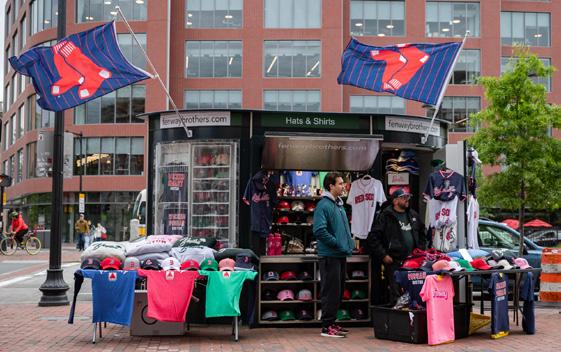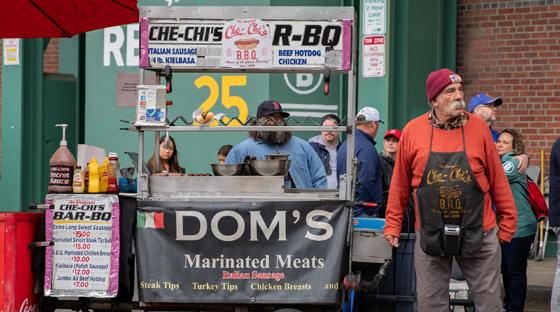




BY LAUREN ALBANO Editor-in-Chief AND MADYLINE SWEARING Senior Writer
Boston University President Melissa Gilliam stressed the need for community and collaboration during an “unusual” time for higher education, as the societal role and importance of universities nationwide is called into question.
“Difficult times give you opportunities to think in different ways and to be even more ambitious,” Gilliam said.
Gilliam reflected on her first year as president in an interview with The Daily Free Press May 9. She highlighted efforts to streamline partnership between the Charles River and Medical campuses, the effects of federal policies on the University community and hopes to foster a community that encourages civil discourse, addressing the goals she set ahead of the 20242025 academic year.
One major initiative to spearhead these efforts was the launch of the Living Our Values Project in October, which identified core principles to foster “inclusivity, integrity and positive impact” across BU.
The project held more than 80 discussions with students, faculty, staff and alumni about guiding values and “what sustains our community,” which Gilliam said are imperative at a time when issues are highly polarized.
The University is pivoting from its 10-year Strategic Plan, BU 2030, because it has already reached many of its goals, Gilliam said.
Now, the University is developing a “strategic framework” that will allow administration to foster interdisciplinary connection. Gilliam said the framework is more necessary than ever at a time when convergent research, operational infrastructure and the role of
artificial intelligence are being questioned.
Existing initiatives from BU 2030, such as establishing “global hubs,” will still be implemented, Gilliam said.
“There are many things that we just didn’t anticipate in 2018 when BU 2030 was being developed that really we have to address now,” she said. “It’s less about the current climate and much more about what does this moment demand?”
Gilliam said she is particularly enthusiastic about the Artificial Intelligence Development Accelerator for Academic and Administrative Excellence — an initiative launched in April aiming to prepare the University community in navigating the “evolving landscape of generative AI.” She said AIDA will bring BU to the “starting line” of development to “accelerate” University operations.
Gilliam said the University also established a single provost for the entire school and is currently searching for two new deans for BUMC to develop alignment across the administration. Both accomplishments are milestones in the University’s mission to integrate BU’s two Boston campuses.
“[The partnership] will have all these downstream consequences and benefits for patients and for research and for our ability to collaborate across the University,” Gilliam said.
As an R1 institution, the highest level of research from doctoral universities, and the largest safety net hospital in New England, Gilliam stressed how cuts to Medicaid and Medicare budgets undermine the institution’s “way of life.”
“We are the place that cares for the poor and underserved in Boston, but we also create the innovations that drive much of the care for the poor and underserved across the country,” she said. “I don’t think people fully understand the role of universities in society or the threat
to universities and society.”
To emphasize the importance of constructive engagement regarding higher education, Gilliam joined more than 650 college presidents in co-signing a letter published April 22, speaking out against “unprecedented government overreach.”
“Single voices are not as powerful right now,” Gilliam said. “Group voices and the opportunity for people to come together and make those types of statements are really helpful.”
Gilliam said constant communication with BU’s Office of Federal Relations and the Association of American Universities in Washington, D.C., has been essential in staying at the “forefront of information” to support the University community and operations.
International students, who make up 22% of the BU community, have been especially susceptible to recent executive orders — many of which impose stricter immigration policy.
The International Students and Scholars Office sent emails affirming its stance and services, organized “Know Your Rights” sessions and communicated with students about their visa statuses, Gilliam said.
For students involved in on-campus activism, procedural changes at the federal level have raised additional concerns about campus security and the sanctity of student speech.
In March, student groups launched calls for BU to declare itself a sanctuary campus, although the University has not done so. Gilliam said these calls led her to establish BU Support Pathways — a resource hub designed to support BU’s global community.
to understand where the disconnect was between what the University was doing and what the students were asking for,” she said. “There’s been a lot of dialogue that led to some of the programs that we’ve now built.”
Gilliam’s inauguration was interrupted by student protests surrounding the Israel-Hamas war and the BU Graduate Workers Union and BU ResLife Union strikes.
When it comes to protests on campus, Gilliam said it was a balance between encouraging free speech and limiting interruptions to other missions of the University. However, she added that part of a higher education institution is creating “a space for students to learn how to be activists.”
Gilliam said she prioritizes meeting with student governments, club leaders and
ambassadors to promote partnership and collaboration within BU. This extends to other events like senior brunch and eating lunch with students she meets along Commonwealth Avenue, including accompanying a first-year student to their favorite Thai restaurant.
“People who are close to a problem are often the ones who know what we need,” she said.
Gilliam wants to prioritize convergent research, continue faculty and operational development and involve students, faculty and staff in envisioning the BU they want to see in the future.
“I know there are a lot of things that you read in the newspaper and a lot of things that make it a challenging time,” she said. “This is such a spectacular institution … so even despite all of these things, I just feel just so fortunate.”
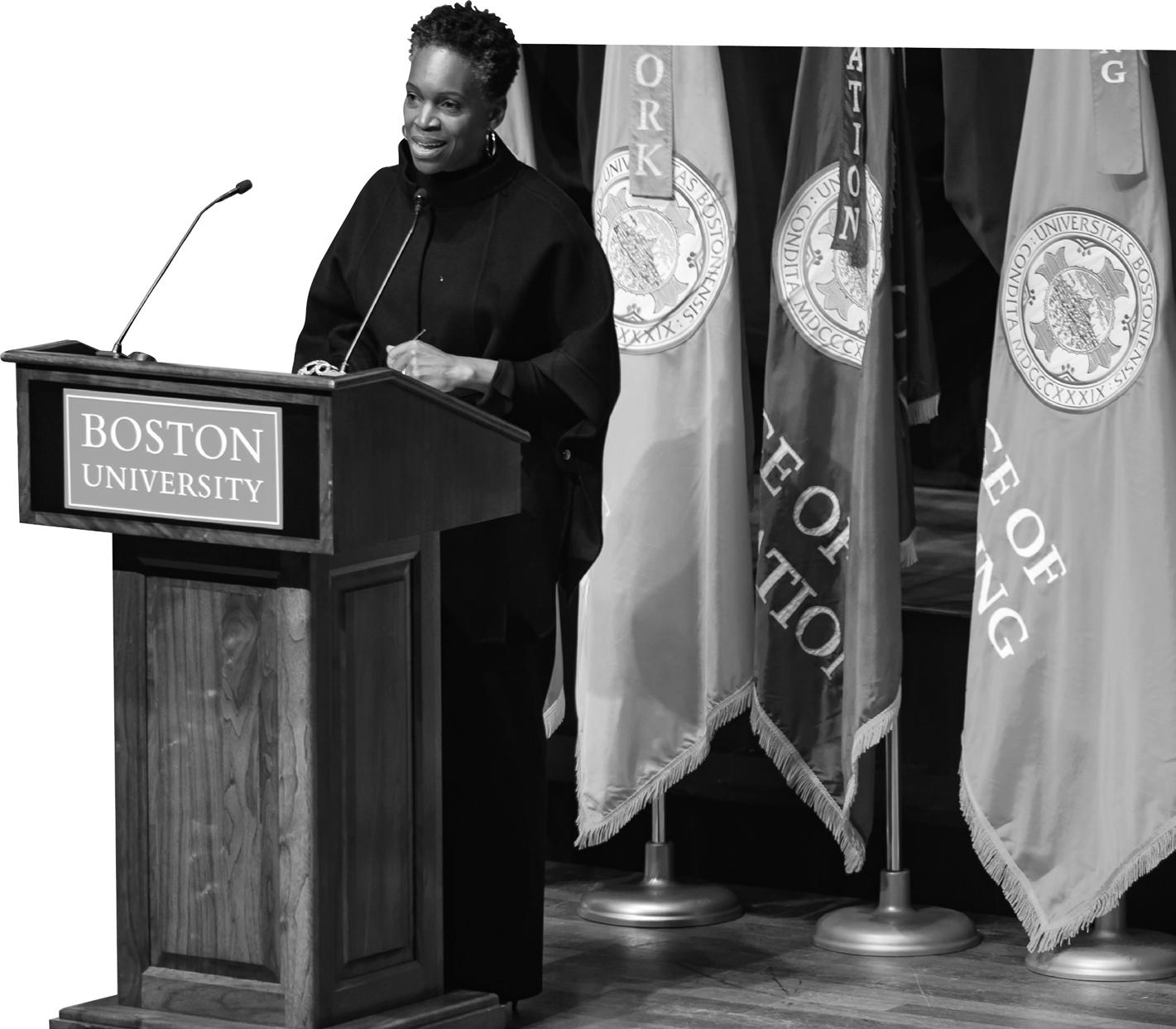
“The first thing was
BY DANIELA GINSBURG Associate Campus Editor
Boston University’s Frederick S. Pardee School of Global Studies is introducing a new wave of junior faculty after several senior professors have retired in recent years.
Professors Igor Lukes, Joseph Fewsmith and Jorge Heine retired at the end of the 2024-2025 academic year. In 2024, Susan Eckstein and Vivien Schmidt retired, and in 2022, Erik Goldstein and Houchang Chehabi retired.
Scott Taylor, dean of Pardee, wrote in an email to The Daily Free Press the school experienced
a high number of retirements from senior colleagues in a short span.
However, these professors all had “long, illustrious careers,” he wrote.
All of the retiring professors were granted Emeritus status, an honor recognizing their lifetime contributions to the university and allowing them to maintain their academic rank.
Pardee has hired many new professors since — including Alexander de la Paz, Aimee Genell, Tsitsi Musasike, Solomon Owusu and Sanne Verschuren — to succeed retiring senior colleagues, Taylor wrote.
“These wonderful new faculty members doing exciting research and teaching will help us build on the marvelous legacy of our retiring

and recently retired colleagues,” Taylor wrote.
Founded in 2014, Pardee aims to grow its scholarly capacity by employing professors on the tenure track, professors of practice, visiting practitioners and post-doctoral scholars, according to the school’s Strategic Plan.
Robert Hefner, a current professor in Pardee and the College of Arts and Sciences Department of Anthropology, helped create the Pardee School as a member of the faculty committee. He said the school has maintained its founding vision — to provide a place where a wide variety of disciplines can discuss global affairs — with its new hires.
“The major question mark for all of us lies not in the principles by which we’re going to continue to staff and make faculty choices,” Hefner said. “It really has to do with our ability to realize that ambition in a university and national climate that is a little bit more restrictive.”
Hefner said the school planned for retiring faculty to be replaced by professors similar in focus to the retiring faculty member.
So far, each retiring professor has not been succeeded by a professor of equivalent study, as “hiring decisions vary in regard to academic field,” Taylor wrote. However, Pardee is not downsizing, and the school expects new hires in the coming months, he added.
William W. Grimes, a Pardee professor, wrote in an email to
The Daily Free Press that losing these professors will be a “great loss of interesting conversations and valuable viewpoints,” but he is confident the junior faculty will continue to uphold Pardee’s mission.
“What makes the Pardee School unique is that, rather than differentiating among disciplines or between scholars and practitioners, we consciously seek to bridge gaps,” Grimes wrote. “We are interdisciplinary rather than multidisciplinary — nearly all our faculty draw on scholarship from multiple disciplines.”
Matthew Turner, a recent graduate of Pardee, took many classes with now-retired Pardee professors and said he noticed differences in teaching styles when he took classes with newer faculty like Genell.
Turner said senior professors tend to teach through lectures, while junior professors lean toward class discussion. He said he prefers more “traditional” style classes with professors like Lukes.
“Lukes has lived through the era that he teaches about,” Turner said.
Yoomin Kin, a sophomore in Pardee, also had class with Lukes and said many senior Pardee professors have unique field experience.
“They share stories of things that they experience on the ground, people that they met when these historical events are happening,” Kin said.
However, Kin acknowledged the new professors’ connection to
current events and said they tend to be more realistic about the job market.
Grimes wrote he believes the new faculty members are highly qualified, with one of key determinants for hiring in Pardee being real world experience.
“Our junior faculty are directly involved in a variety of policy discussions, ranging from security to development to migration to human rights and global justice,” Grimes wrote.
Turner said despite the loss of senior professors, the new professors teach quality classes tailored to their own experiences.
Kin said despite it being unfortunate for the students who learned from them, “it’s the reality of what happens when professors are done teaching at a university.”
Hefner said he believes the school upholds Pardee’s founding vision when hiring younger professors whose teaching aligns with that of the retired faculty, despite recent changes.
“This transition is taking place at a time of considerable economic uncertainty, both at Boston University and in the university academy nationally,” he said.
However, Hefner said he remains optimistic.
“The Pardee school will hold to that twin vision of both state-ofthe-art, academic study and realworld intervention, with the idea of making the world a better place,” Hefner said.
BY EMMA MULLAY Associate City Editor CITY
Tariffs imposed by President Donald Trump have sparked fears surrounding a potential surge in prices across Boston restaurants, leaving some community members worried for the financial future of smaller local businesses.
Since beginning his second term in January, Trump has declared a number of tariffs in a bid to increase domestic production and address trade imbalances with
other countries.
However, these policies could spike the price of eating out, as some believe restaurants will pay significantly more to outsource certain goods from foreign countries.
Some dine-out staples are only available overseas, leaving restaurants with no choice but to import, said Jessica Moore, director of government affairs for the Massachusetts Restaurant Association.
Robert Binney, chair of the Boston Ward 5 Democratic Committee, said the hiked taxes
will be “devastating” for the Boston service industry.
“Many of the goods and equipment that restaurants need are imported,” Binney said, noting that protein, produce and kitchen equipment — such as stoves and refrigerators — are usually produced outside of the United States. “The prices are going to increase. There’s no question about it.”
Tariffs may force restaurants to lay off workers, raise prices for consumers or decrease the quality of their products, Binney said.
Trump’s stance on the global

trade war has also fluctuated, as the president has paused tariffs on certain countries while reviving threats to announce steeper ones on others, according to the New York Times.
This “back-and-forth” has left Lucia Patrick, the co-owner of the Solid Ground Café in Mission Hill, struggling to gauge the extent to which her business may be impacted.
“It’s hard to keep track of whether they’re happening or not,” Patrick said. “Currently, I haven’t seen an increase of prices of certain items that I think would generally be affected … but I do anticipate it.”
The Solid Ground Café imports its coffee and tea, and Patrick said prices have already increased due to “market volatility” and “environmental challenges.”
“Our [coffee] supplier has suggested that when tariffs do really come into play, that it’s going to increase the prices again, which is really a bummer for everyone in the value chain,” Patrick said.
“Tariffs would really be a hardship for everyone.”
Moore said the MRA is working to help “mitigate” the potential effects of tariffs.
“What we really hope is that we are able to work with government officials to make it so the tariffs don’t have a significant impact on the price that restaurants are paying for certain goods,” Moore said.
For instance, champagne, tequila and Jameson whisky are popular items becoming increasingly difficult to import, Moore said.
“We hope that we won’t see a significant impact to the bottom
line for those restaurants,” she said.
However, some worry that small businesses will bear the brunt of the market chaos.
Binney said while chain restaurants “know how to cover each other,” smaller restaurants will find it harder to overcome the effects of tariffs.
“The little guys, the one and two little restaurants around, the ones that we love to go to, the ones that cater to the locals and have the unique food offerings that we love, they’re not going to be able to provide that anymore in the quality that they use and their service,” Binney said.
Patrick said tariffs would force her to raise prices for customers to ensure employees are paid fairly and that her family is making a living.
“This is my family’s only revenue stream … I own [the café] with my husband, and we have a family, so these tariffs would definitely hit,” Patrick said. “These tariffs would definitely hit small business owners much harder than big chains, but I think everyone would feel it either way.”
She added that surging prices may have an impact on Bostonians’ way of life and how they spend their money.
“There might be folks in the community who can adjust to rising prices, but there certainly are folks who may not be able to handle that and have to change their lifestyle,” Patrick said. “But even so, whether it’s the restaurant industry or groceries, food is gonna increase [in price] across the board. It’s just bad news to have these tariffs, I think, for us to just live.”
BY PHOEBE MILLER Associate City Editor CITY
In an attempt to ditch the “sleepy city” allegations, Boston leaders have awarded grants to businesses and increased the distribution of liquor licenses with hopes of enlivening city nightlife. However, community members and leaders highlighted some issues that often hinder a Boston night out.
Corean Reynolds, director of Boston’s Office of Nightlife Economy, serves as a link between City Hall and stakeholders within the nightlife economy and is looking to change Boston nightlife’s “bad rep.”
“Maybe some folks have said it’s boring, but that’s just not the case,” Reynolds said. “Our neighborhoods represent different cultures and different interests, and so nightlife in Hyde Park might look like a paint night at Canvas Studio, but nightlife in the Back Bay might look like night out at Dani’s Queer Bar or at Hue’s.”
Reynolds said the office has led several initiatives to improve the city’s nightlife since its establishment in March 2023.
Through one of these initiatives — the Wake Up the Night Grant Pilot Program — the office awarded just over $300,0000 in federal funding to 41 grantees in August 2024. The awarded businesses held more than 50 events featuring hundreds of artists and vendors in 13 different neighborhoods. Events were attended by over 19,000 residents, Reynolds said.
City Hall recently hosted a number of nighttime events, Reynolds said, including a pajama party, speed dating event, comedy night and Ramadan night markets.
“We’re really rethinking what
City Hall looks like and how City Hall shows up in nightlife,” Reynolds said.
In February, the City of Boston Licensing Board approved 37 new liquor licenses for restaurants, according to the City of Boston.
The initiative provided a way for non-citizen restaurant owners to be the record keepers of their own liquor licenses.
“That was huge for everyone who isn’t a citizen and owns a restaurant,” said Jessica Moore, director of government affairs for the Massachusetts Restaurant Association. “It really puts the power in the hands of the person that owns a restaurant.”
Moore said liquor licenses should be distributed in areas of the city where they are needed, adding that access to alcohol boosts business.
“When a business owner has the ability to sell beer, wine and liquor, all three, it’s profit for their business,” Moore said. “More people come. More people stay later.”
Reynolds said certain citycentric policies have made it historically difficult for businesses to obtain liquor licenses.
“Boston is one of the only cities in the state of Massachusetts whose cap on liquor licenses doesn’t grow when the city’s demographic grows or one of the populations grows,” Reynolds said. “That puts a big burden on creating new spaces for folks to gather.”
Senator Julian Cyr, who represents Cape Cod and the islands, described the state’s process of approving liquor licenses as “old-fashioned.”
The state legislature maintains the oversight and authority to approve additional liquor licenses for a given city or town, he said.
“It sets up very much this sort of

‘Mother may I?’ dynamic between municipalities and the state,” Cyr said.
Statewide policies also forbid establishments from serving alcohol past 2 a.m. and selling discounted alcohol. Massachusetts is one of only eight states that bans happy hour.
Cyr said this puts bars, restaurants and nightlife businesses at a “competitive disadvantage.”
Cyr petitioned a bill, Senate 217, to the Massachusetts state senate in February in an attempt to lift the decades-old happy hour ban.
“The bill would allow cities and towns to opt in to permit discounted drink promotions through local ordinances,” Cyr said. “It would
empower municipalities to choose what works best for them, given the needs of the community.”
For some, high prices and a lack of late-night transport options can turn a Boston night out into a “hassle,” said Maia Barantsevitch, a junior at BU.
“I know friends who pay their own tuition, who have to work multiple work-studies and jobs, and they can’t even prioritize nightlife because it’s so expensive,” Barantsevitch said.
Barantsevitch also noted students usually fork out an additional $20 to $30 for transportation after a night out, due to early MBTA closures.
“Oftentimes, [the MBTA] says
the T stops at 1:00 [a.m.], but the last train will run by 12:30. That’s most of the Green Lines, which is what the majority of students in Boston take,” Barantsevitch said. Reynolds said one of the challenges the Office of Nightlife Economy faces is balancing the needs of all types of Boston residents.
“A neighbor might want something different from a business owner, and a patron might want something different from a neighbor,” Reynolds said. “Ensuring that I listen to those voices and apply their concerns and their wants and needs to the solution has been successful, but also a challenge.”
BY SAMANTHA MARSHALL Senior Writer
Whether a headliner or first timer, a local or out-of-towner, every act that played the Boston Calling Music Festival, from May 23 to 25, arrived prepped and ready to put on their best performances for audiences of thousands.
While concertgoers saw the performances, what they didn’t see were the countless hours of rehearsal and preparation devoted to making the festival a success.
Members of an indie rock band from Oklahoma, Wilderado, preferred being underprepared for the event.
“It never goes the way you want,” said Max Rainer, guitarist and lead singer. “Don’t expect much, and everything is so much better.”
Rainer said the band’s goal is to make the audience “feel at home” with them.
Guitarist and vocalist Tyler Wimpee said booking festivals can be “run and gun.” Thus, Wilderado curated their Boston Calling setlist by choosing songs that best represented the band for audience members who don’t know who they are, he said.
“There’s no way to please everyone, and you hate to say it, but the only real way to do it
is please yourself,” Rainer said. “Hopefully, it comes across as a holistic experience, not just about playing karaoke on your own.”
For indie pop group, I Don’t Know How But They Found Me, the members live in separate states. Though the band doesn’t rehearse together often, they bond through a pre-show ritual.
This is referred to as a “birdup,” where the band members shake hands, link their thumbs to create a wing shape and move them up into the air to mimic wings flapping, singer-songwriter Dallon Weekes said.
Weekes said it’s important to prioritize individual practice and trust that everything will come together.
For other performers, it’s a lengthier process.
Maggie Hall, singer of New England-based pop band Copilot, said the band has long aspired to play Boston Calling.
“It’s a dream,” Hall said. “It’s always been a bucket list [item], something we’ve been hoping [and] striving for, and the fact that we’re here together means a lot.”
Ever since the band got the call to perform, they spent a lot of time practicing at The Record Co., a local production studio.
Prior to each set, every member of Copilot puts their index finger into the center, like an all handsin cheer before a sports game,
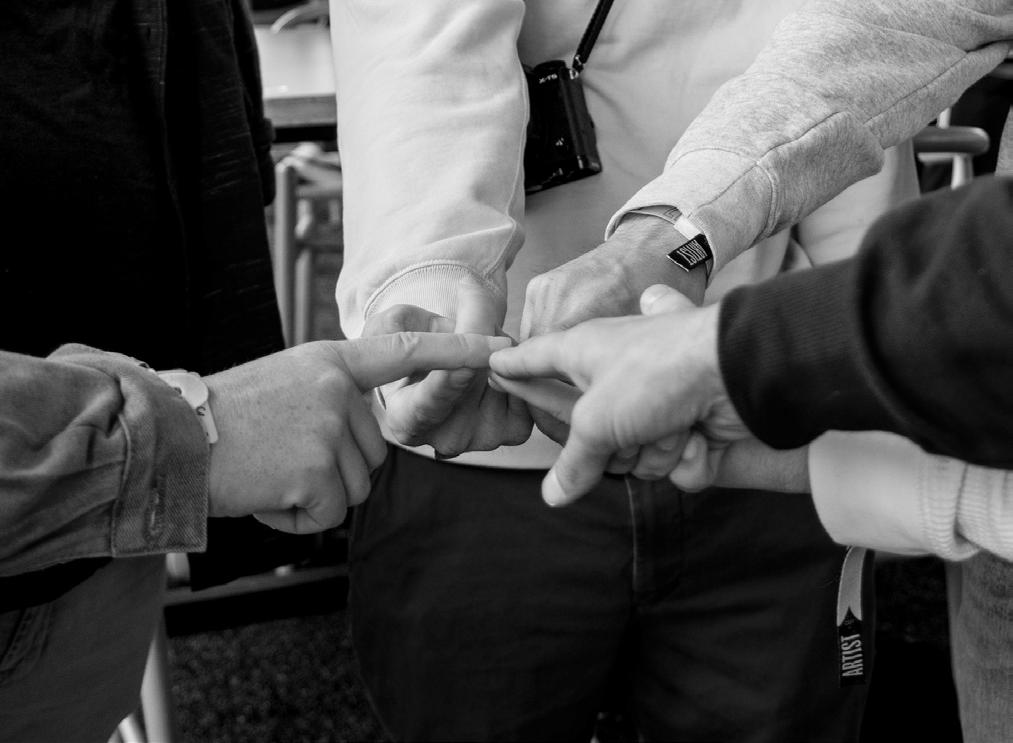
The members of New England band Copilot put their index fingers together to demonstrate the band’s pre-show ritual. Each artist who played Boston Calling brought their own personal style, which can be seen in their efforts to prepare for their performances.
signifying the band’s goal for their first track to hit one million streams.
“We’re manifesting, all right?” said guitarist and singer Ry McDonald.
Art rock band Sidebody began practicing, building their set and preparing their setlist after receiving word eight months ago that they would be performing, said drummer, singer and bassist Martha Schnee.
Schnee said Sidebody crafted a special set for Boston Calling, playing off the festival’s name with a literal phone theme. The band wore handmade costumes by designer Emma Fritschel,
which were inspired by the bright colors of children’s television shows and old phones.


Vocalist Hava Horowitz wore a sash with a hotline number that read “Call me,” inviting fans to call in and share their Bostonbased stories. The band plans to turn those stories into a song, Schnee said.
“Boston Calling. They called,” Schnee said. “They called us.”
With friends and family at the festival to watch them play, Copilot singer and tambourinist Jake Machell was elated to perform at Boston Calling.
“You’d think with the amount of times over the last handful of months that people have been like, ‘Are you stoked for Boston Calling?’ that answer might change a little bit. It [hasn’t],” Machell said. “It’s just gotten more crazy and more exciting. I’m as excited now as I have ever been.”
Kate Kotlyar contributed reporting.
BY MARY GOETZ Associate Community Editor
With over 37,000 students and no defined campus borders, Boston University does not promise a typical college experience.
Commonwealth Avenue runs freely through the city of Boston, making it difficult to distinguish urban living from BU’s campus. While one could assume this interferes with college life, it only enhances BU’s sense of community and tradition.
1. Painting the BU Greek Rock
The BU Greek Rock — commonly known as the BU Rock — is a large painted boulder in Central Campus.
Covered in more than 1,000 layers of spray paint, the rock
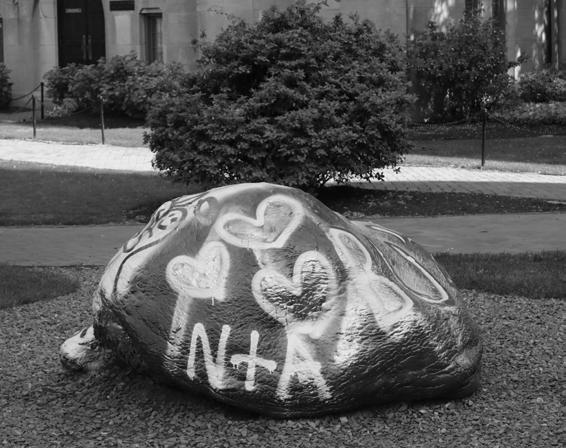
has been a focal point of BU Greek Life for decades. During Greek Week, BU’s sororities and fraternities competitively spray over one another’s tags, changing the rock almost daily.
Jaise King, a sophomore and campus tour guide, said he always shares this tradition with prospective students.
“It started off as a little pebble, but as more layers of spray paint are added, it’s gotten to its current size,” King said.
Other campus clubs join in as well, making painting the BU Rock a tradition that extends beyond Greek Life, King said.
“One of my clubs is planning on painting the rock next year, and I’m excited to do that,” he said.
2. BU hockey chants
In addition to Greek Life, the student body is blessed with a


vibrant hockey scene. While the BU Terriers are ranked eighth in D1 Men’s Ice Hockey and boast more than 100 alumni in the National Hockey League, many are fans of the lively student section — aptly dubbed the Dog Pound.
At each game, the Dog Pound prints a “Dirty Laundry List” with information on the opposing team — “why they suck, who their sieves are” — and “opponentspecific chants to heckle them about,” according to the Dog Pound FAQ sheet.
Junior Lily Thorpe recalled the surprise of attending BU hockey games and learning the chants on the “Dirty Laundry List” — something she’s come to value as part of her college experience.
“I’m a big hockey girl, and [it’s] something I didn’t really expect coming into BU,” Thorpe said. “Freshman year, I was like, ‘Oh my God, this is so fun,’ and then I learned all the chants.”
She said her personal favorite is when the student section turns their backs to the ice during the opposing team’s introduction, waving their fingers and pointing.
Other traditions include yelling “sieve” at the opposition’s goalie when the Terriers score and throwing hats onto the ice after the Terriers score a hat trick.
“The energy is just so good,” Thorpe said.

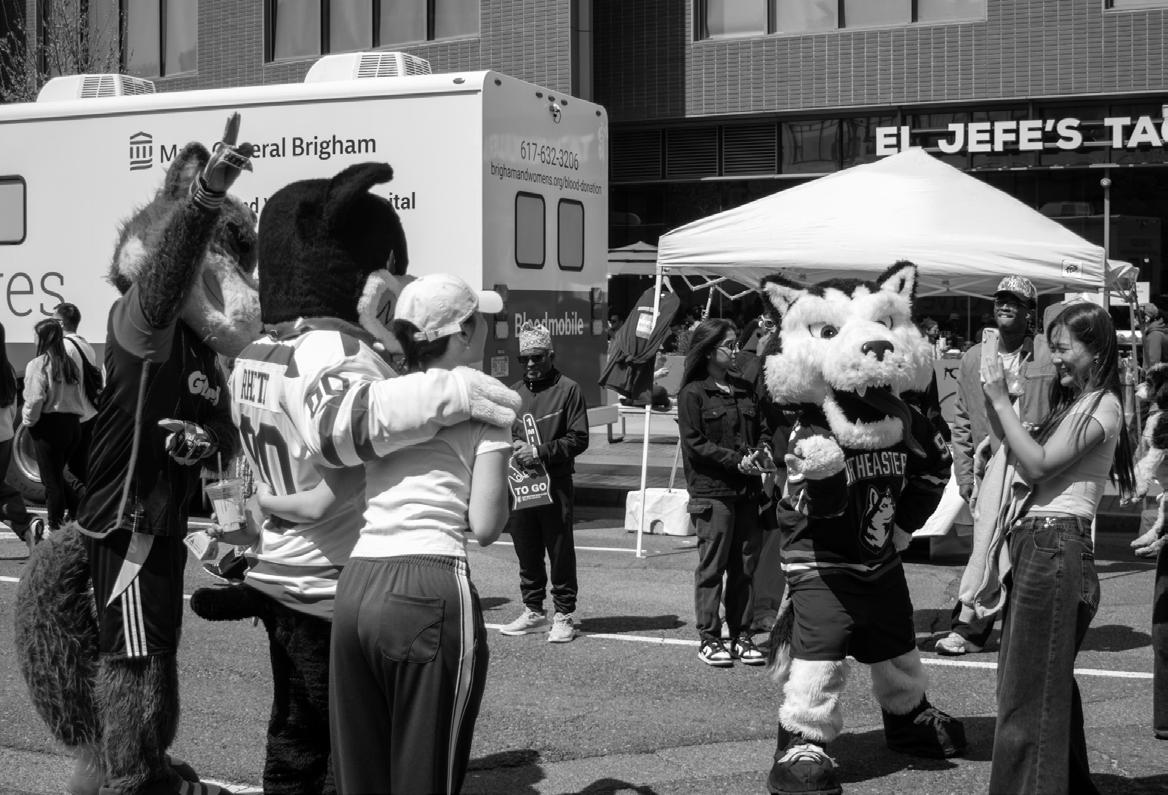
3. A slice at T. Anthony’s
While BU’s campus offers an array of restaurant choices, many students are partial to T. Anthony’s Pizzeria — open from 11 a.m. to 2 a.m.
Established in 1976, T. Anthony’s honors its Terrier patrons by covering its walls in BU sports paraphernalia. After a BU hockey game, Thorpe said she’s partial to grabbing a slice at T. Anthony’s.
“That’s definitely my spot,” Thorpe said. “I’m forever a T. Anthony’s girl.”
4. MarMon
The neighborhood of Allston, which is a close walk from West Campus, is home to several BU fraternity houses. While the frats throw parties on any given weekend, the city of Boston’s own traditions are sometimes specially integrated.
The Boston Marathon, held annually on the third Monday of April, is celebrated by college students and Bostonians alike.
While some students honor the day by standing alongside the marathon trail to cheer on runners, others attend parties held from early morning to late afternoon.
King said one of his favorite traditions at BU is “MarMon” due to everyone’s excitement.
“It was just such a fun and
vibrant time around the city of Boston,” he said.
5. Red Sox game at Fenway Park
At a university so enmeshed in Boston sports culture, many Terriers pass their time at Fenway Park catching a ball game. In signing up for Student9s, the official student ticket program of the Boston Red Sox, BU students can receive discounted $9 tickets on game days.
Junior Summer Genovese said going to Fenway to watch the Red Sox play, “even [if] you don’t know anything about baseball,” is always great.
However, Genovese said she warns against being caught off guard by overpriced food, recalling an $18 bill for two sausages.
“I mean, jaw on the floor,” Genovese said. “A universal BU experience could be paying for overpriced Fenway food.”
With 186 years and more to come, BU Terriers have had nearly two centuries to invent unique campus experiences and traditions.
As new faces arrive on campus, King said he urges incoming students to talk to everybody at Splash, BU’s fall club fair, and join everything they can.
“A little word of advice, please get as involved as possible … you will thank yourself,” he said.
BY JOHN TATUM Associate Business Editor
Every year, about 3,000 new students join the Boston University community with over 300 majors ranging from music to chemistry and everything in between. For non-business students, entrepreneurship may seem out of reach.
Innovate@BU, a center located on BU’s Charles River Campus, provides students with resources, funding and mentorship to pursue business ventures — regardless of their academic major or background.
Austin Boyer, associate director of marketing and communications for Innovate@ BU, described the center as a place to “develop innovation skills and entrepreneurial mindsets” through events, extracurricular programs and an “innovation and entrepreneurship” minor.
Through the center, all BU students can learn to think like an entrepreneur, he said.
“You absolutely do not need to be a business major to have an impact and to make a change, [to] address a problem [and] be an intrapreneur,” he said.
One of the lowest-commitment ways to get involved, Boyer said, is through free events like “Pitch and Pizza,” where students have 60 seconds to propose an idea for a project and then receive feedback.
Students can also develop their ideas through more time-intensive programs, like the Summer Accelerator and Pathfinder Bootcamps.
By utilizing these programs, some students have gone from having little knowledge on entrepreneurship to running their own businesses.
Meritxell Ortodo, a senior in the College of Engineering, is one of co-founders of Agrinova, a student-led startup working to develop affordable on-site soil testing tools. She said Innovate@ BU helped guide the team and connected them with relevant contacts.
Her introduction to Innovate@ BU was through the New Venture Competition, an annual competition where student founders pitch ideas and receive feedback and coaching, with the chance to win part of the $80,000 in prizes awarded.
Around this time, Ortodo said the team also applied for Innovate@BU’s Summer Accelerator and Innovation Pathway programs, which both provide workshops, mentoring and funding for emerging startups.
The Summer Accelerator program is a ten-week intensive in which student founders receive a stipend of up to $10,000 to work on their ventures full-time. This year, Agrinova was one of 12 teams accepted into the program.
Ortodo said it is “incredibly easy” to get involved with Innovate@BU.
“Even if you just have an idea, they’ll give you a step-by-step list, [saying] ‘This is your idea and this is how it fits,’” she said.
Ortodo emphasized that Innovate@BU is accessible for all students, even those with no knowledge of how businesses function — like herself, a biomedical engineering major.
“Innovate really takes the time,” Ortodo said. “If you go through every step of the process, let’s say of the Innovation Pathway [program], you’re granted all these resources to help you better understand the business aspect of it all.”
Bella Ramirez, a recent BU graduate of the College of Arts
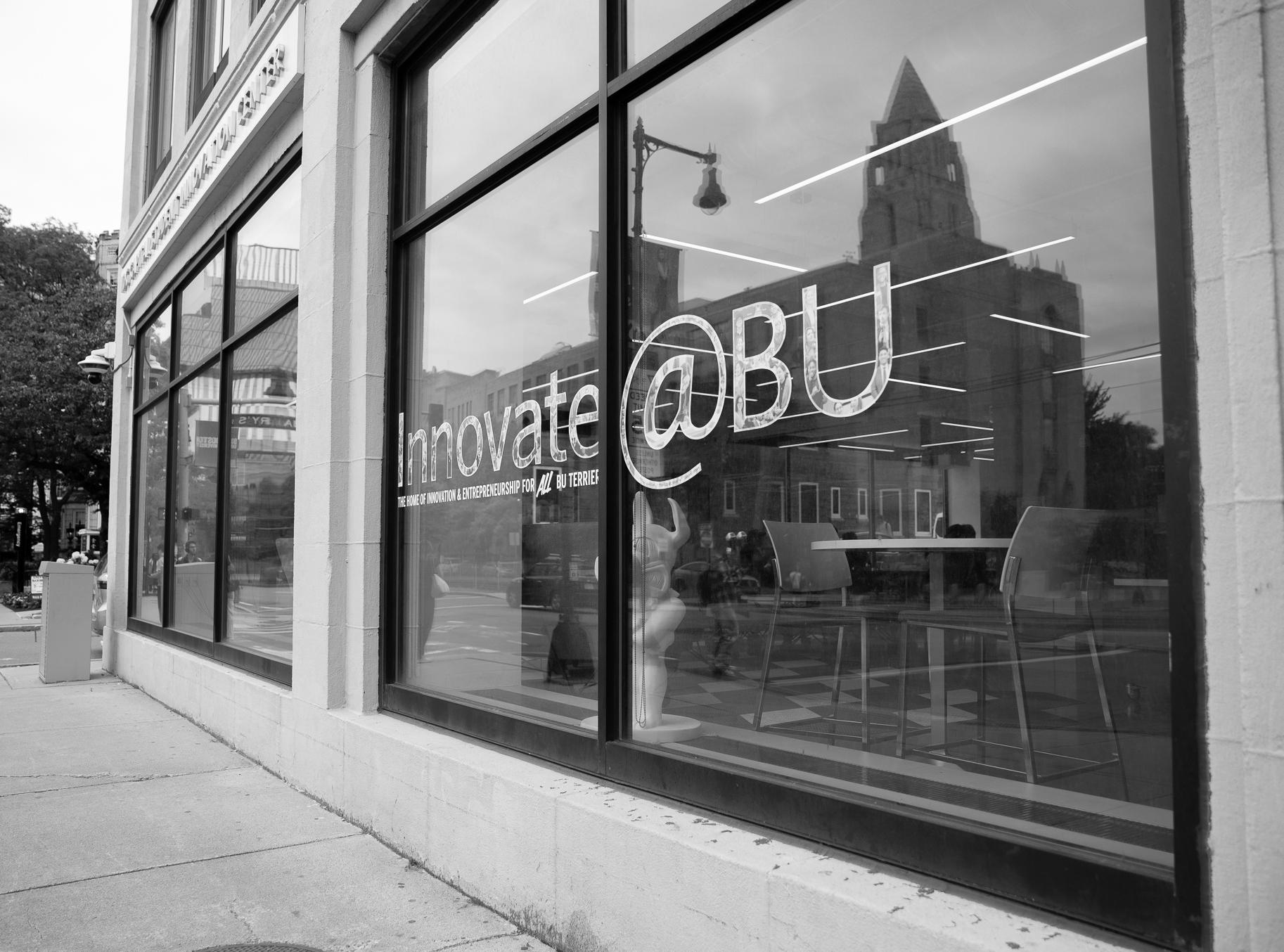
and Sciences and College of Communication, described having a similar experience at Innovate@BU.
Ramirez is the CEO and founder of Wicked Smaht Comedy, an intercollegiate comedy production studio in the Boston area.
“We connect college students in the Boston area to create ‘Saturday Night Live’-style shows so that they’re able to expand their networks as well as get opportunities for stipends for their work in comedy,” she said.
The company uses the funds from their live shows to fund various nonprofits in the Boston area.
“We’re basically a communitybuilding comedy center,” Ramirez said.
During her sophomore year, Ramirez applied for the Innovation Pathway for guidance on Wicked Smaht’s feasibility. She said despite her non-business background, Innovate@BU helped her foster an entrepreneurial mindset and prioritize the tasks needed to run the startup.
“I’ve never taken a class in Questrom,” Ramirez said. “From a transcript perspective, you wouldn’t expect me to have the involvement that I do in business
and entrepreneurship, and that’s purely because Innovate has been able to reach me where I’m at and make me go further.”
Ortodo said her advice for first-year students interested in entrepreneurship would be to “go for it.”
“[Innovate@BU has] the resources and the tools to help you get to where you need to be, and it’s the safest place to do it,” she said. “There’s literally no better support.”
Bella Ramirez was a city co-editor for The Daily Free Press during the fall 2022 semester. She was not involved in the reporting, writing or editing of this article.
BY BRIAN CHAN Associate Science Editor
At first sight, BU doesn’t appear to have much green space. The school’s campus stretches for two-miles along Commonwealth Avenue, one of Boston’s busiest streets, giving it limited space for rolling fields, trees and meadows.
Although green space appears sparse, students and professors
have found a variety of urban sanctuaries both on and off campus.
Green spaces are especially impactful in cities because of their high population densities in small geographic locations, said Pamela Templer, distinguished professor and chair of the College of Arts and Sciences Biology Department.
“Studies have shown students do better in school when they have green space and access to it,” Templer said. “There’s lot of
benefits to having green space.”
On campus, students often play games and relax on BU Beach, a grassy strip behind Marsh Chapel overlooking the Charles River.
The College of Communication Lawn, lined with picnic tables and adirondack chairs, serves as another outdoor space where students study or chat with peers.
Beyond campus, there are several parks, fields and preserves, some of which are only a few minutes away from
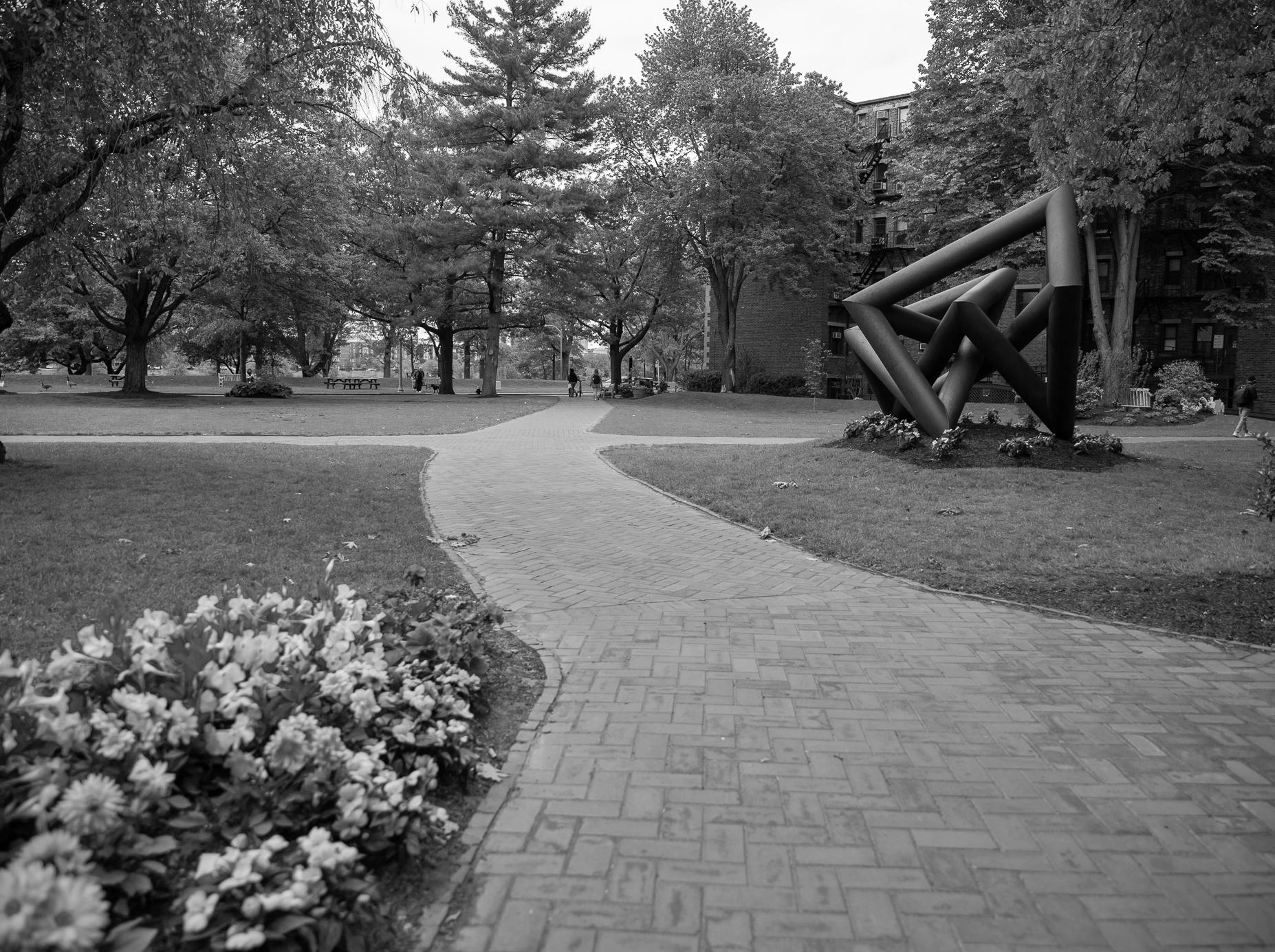
campus.
Sophomore Nathaniel Barrett said the Boston Common, a historic 44-acre public park in Boston’s city center, is a “really nice” green space near BU.
“There’s a lot of historical monuments, and it’s great for people-watching or birdwatching,” Barrett said. “There’s always performers, or just benches you can sit [at] to read or study.”
He added the park is only a few T stops away from Kenmore Station, located on the easternmost part of campus.
Sophomore Noah Ballesteros recommended walking along the Charles River Esplanade, which is accessible from campus using the BU Bridge or pedestrian bridges on Silber Way and Bay State Road.
Walking along this path, people can listen to the water and watch people running along or rowing in the river, he said.
Templer said she loves the view BU gets of the Charles River.
“[The river] connects so many different parts of the city so seamlessly,” she said.
Marcia Pescador Jimenez, an assistant professor in the School of Public Health, said one of her favorite green spaces in Boston is Southwest Corridor Park, a linear park surrounded by trees that stretches from Back Bay to Forest Hills.
“There is something when I watch the leaves move with the air, or even when it’s raining and I hear the drops on the trees. It just brings something in me that calms me down immediately,” she said. “I remember as a little girl just watching the trees and being happy.”
Trees absorb pollutants in the environment and store it as part of their biomass — filtering air and water, Templer said.
“The more they take into their biomass, the less likely you and I are to be negatively affected by it,” she said.
Jimenez added that green space increases opportunities for physical activity and social connection, which both can benefit people’s overall health.
“During the pandemic, I was at home with two little kids,” she said. “I think the one thing that kept me going was [being able] to take walks outside ... I immediately felt my stress levels go down.”
Through her research, Jimenez found that both children and older adults who spend more time in green spaces report higher levels of cognitive function. Her studies also demonstrated that higher exposure to green spaces as an adult is associated with protection against Alzheimer’s disease and related dementias.
The University maximizes the green space available, despite its location, Templer said.
Since she arrived at BU in 2005, Templer has noticed new trees along Comm. Ave. and increased vegetation near where she works.
Although it is impossible to transform the entire campus into a green space, BU continues to work toward becoming more climate-friendly.
“It’s on its road to improving it a lot,” she said. “We can’t completely become greenhouse neutral on campus just because of all the greenhouse gas emissions that are made on campus, but we can [offset] it elsewhere and [invest] in different places.”
BY KATE KOTLYAR
DFP Photographer
In honor of Boston University’s 152nd All-University Commencement, we showcase student and faculty celebrations, speeches and shoutouts as graduates prepare to take their next steps.


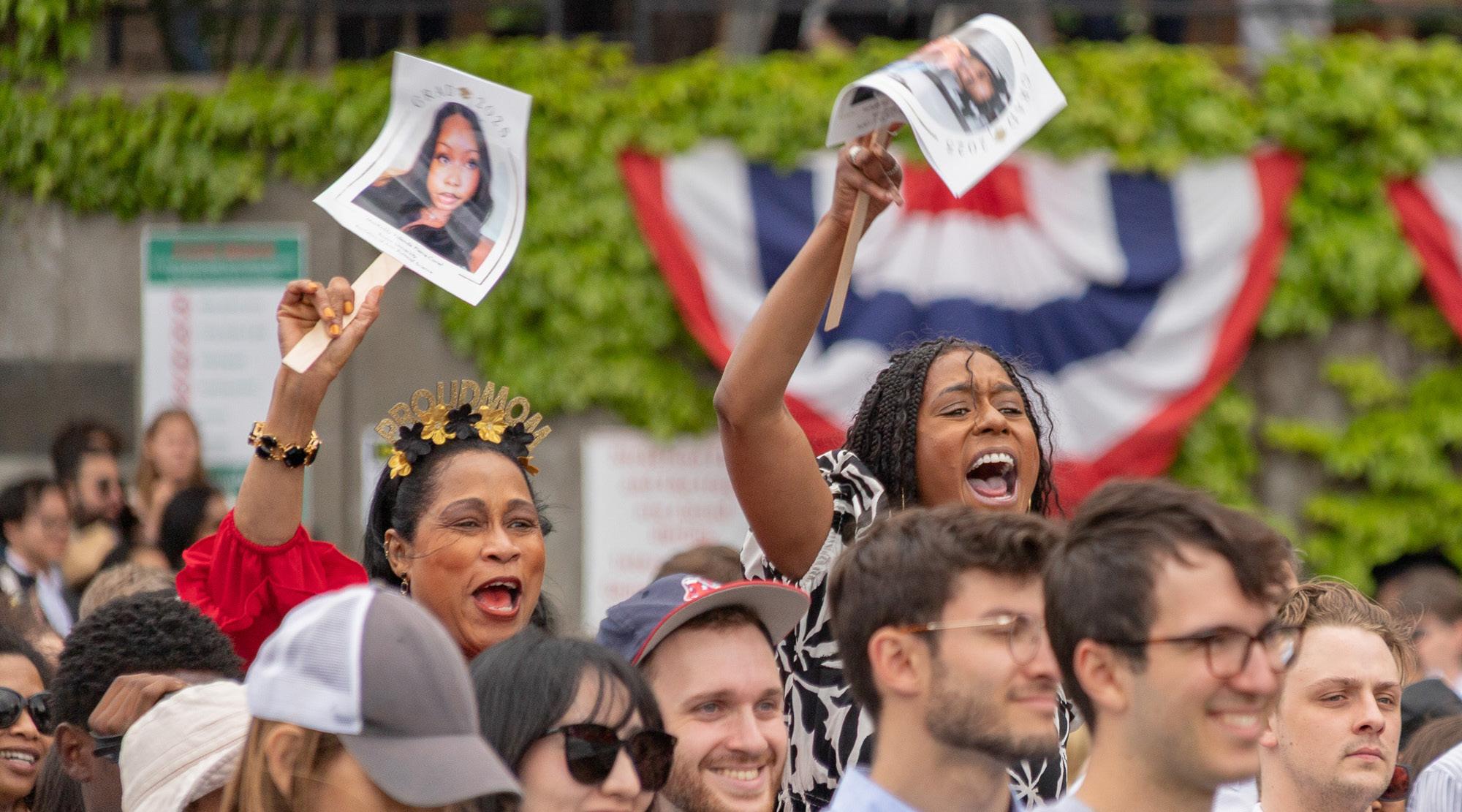


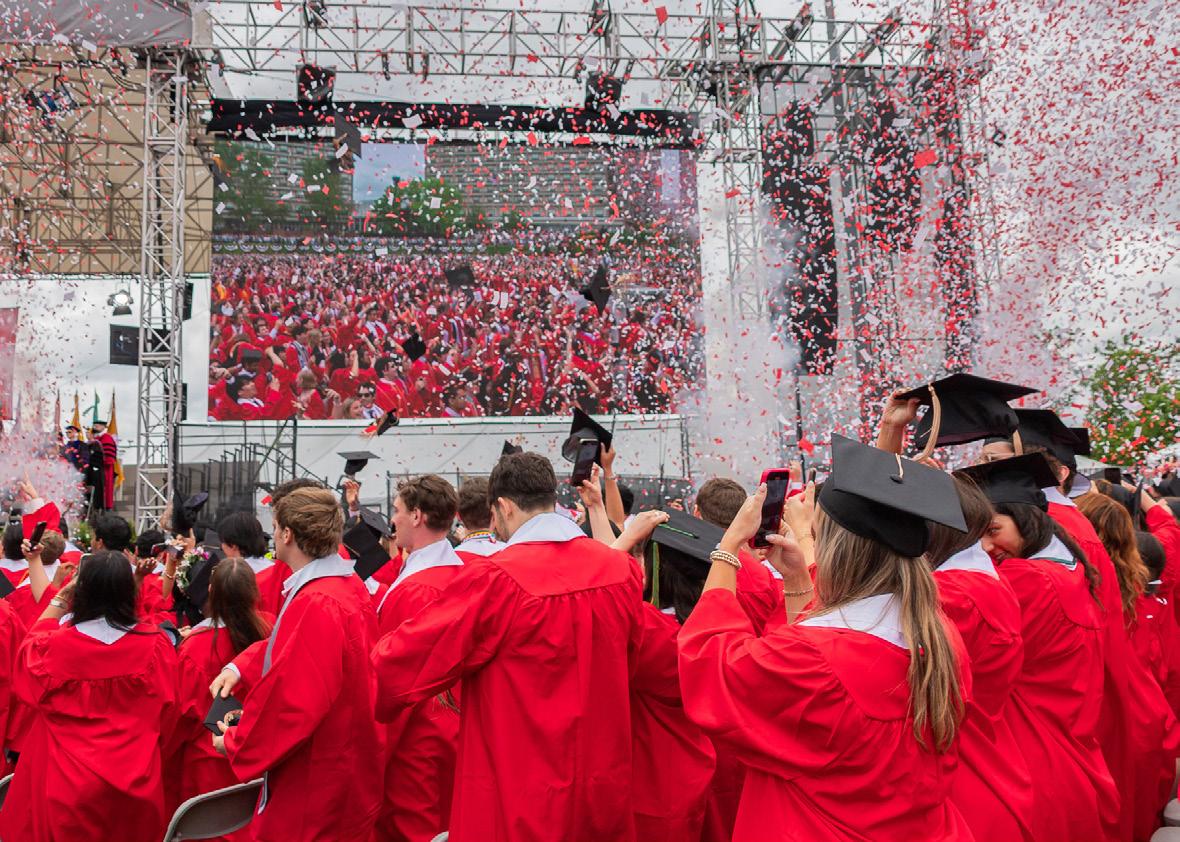
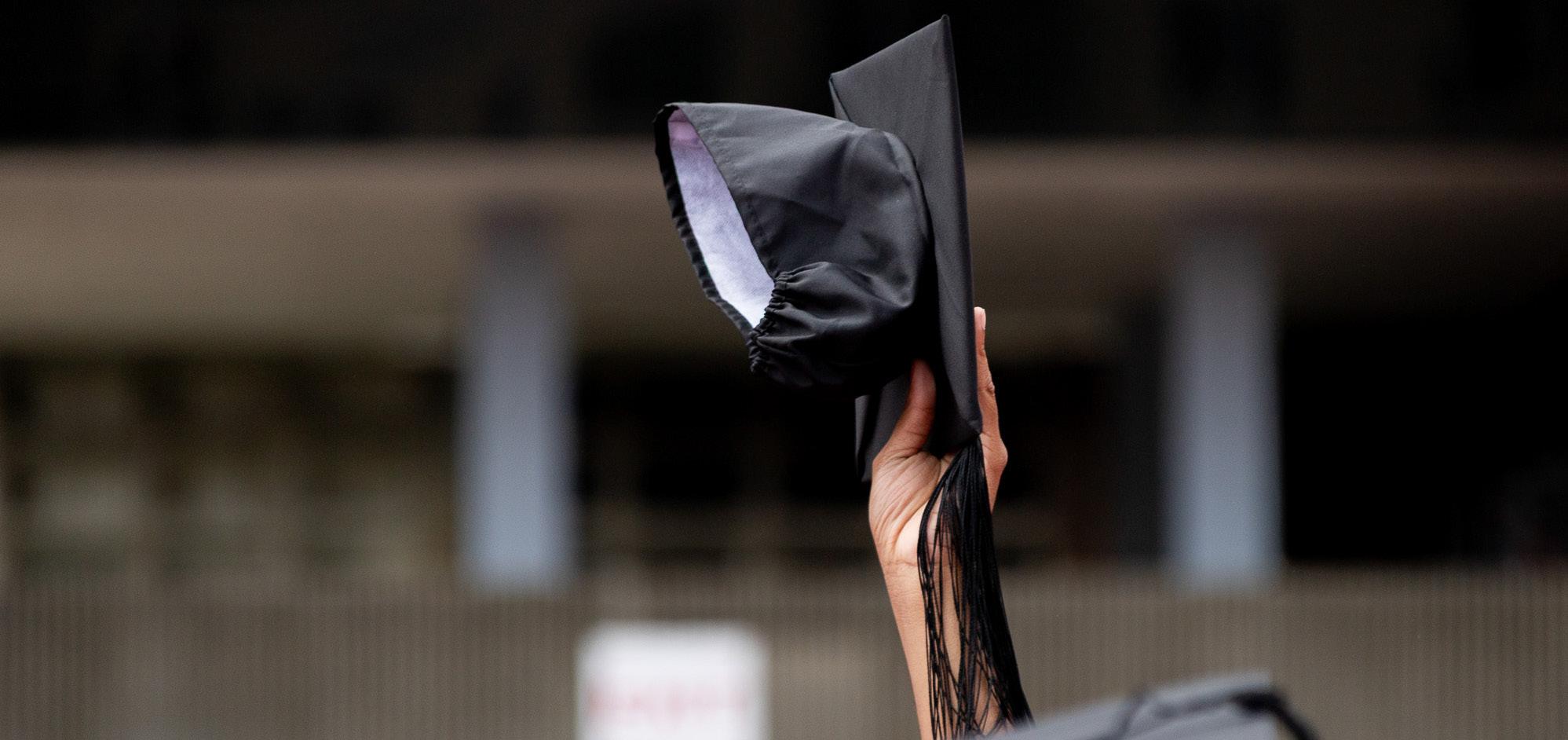

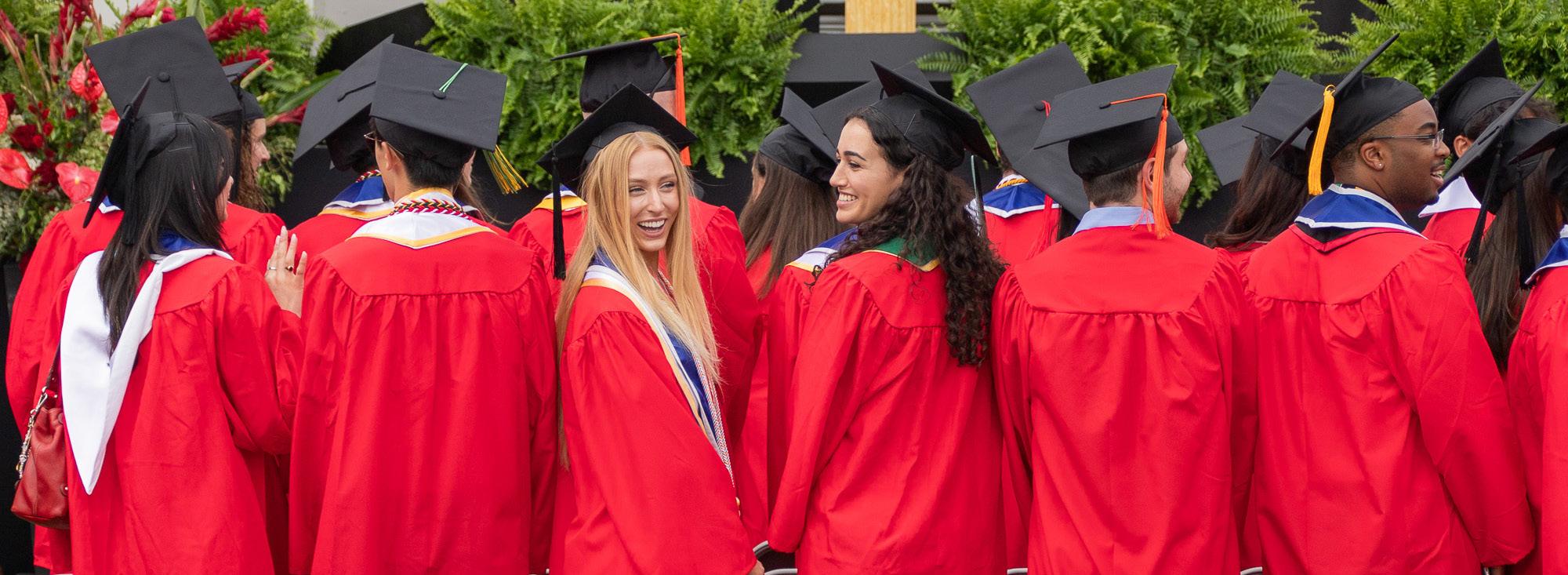
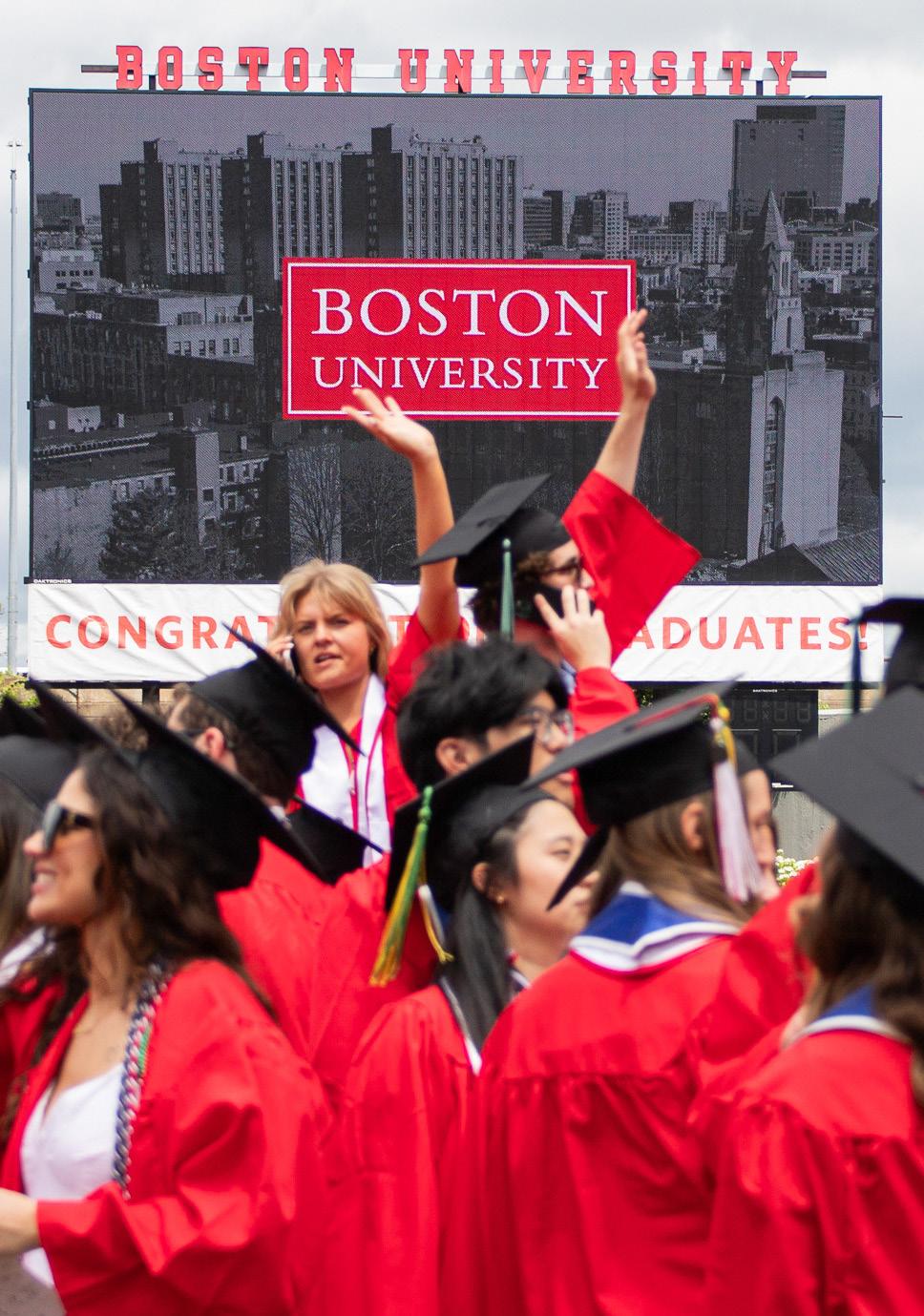
and


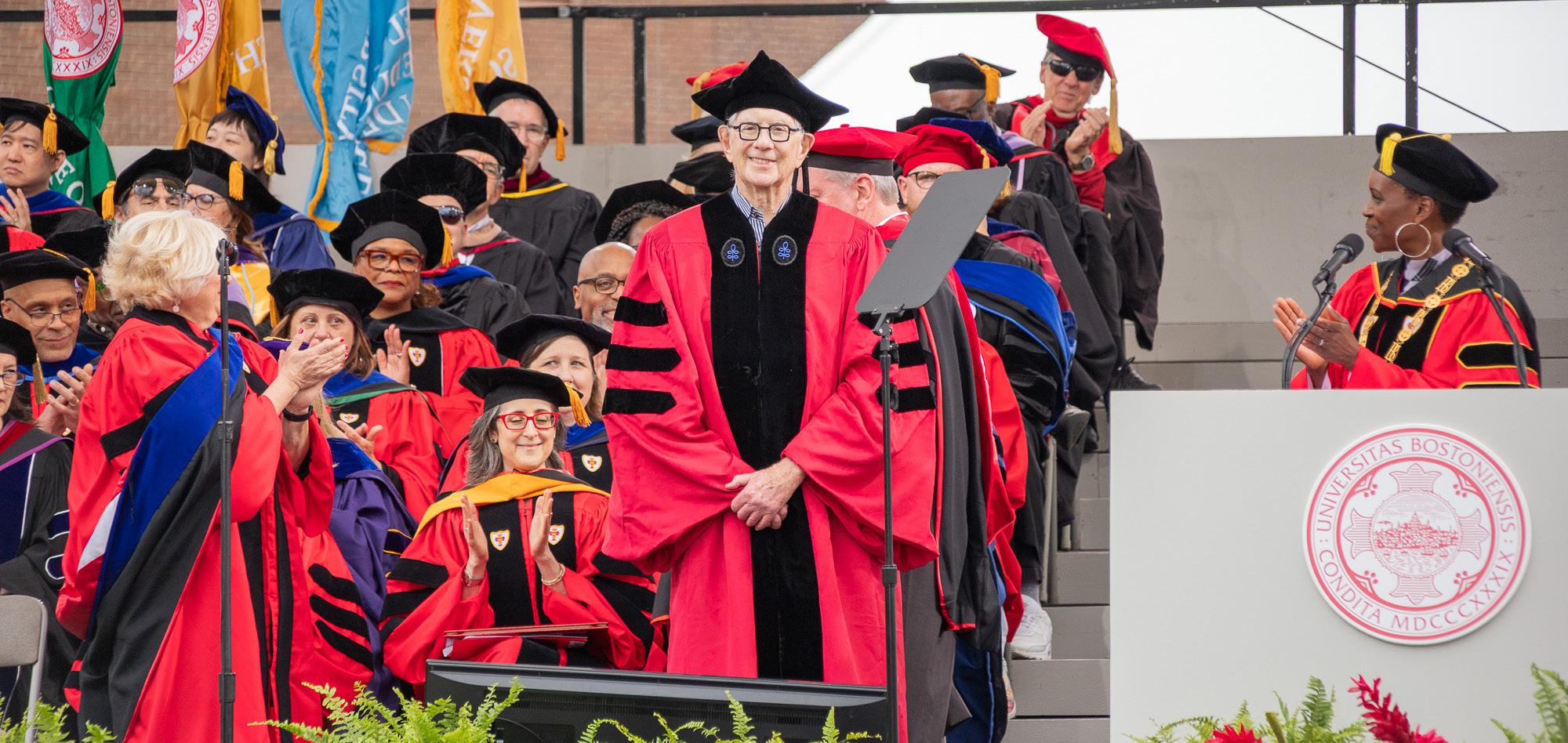
of 2025 honored at BU’s 152nd Commencement
BY SAMANTHA GENZER Managing Co-Editor CAMPUS
The Boston University Class of 2025 covered Nickerson Field in a sea of red and white gowns Sunday afternoon for the 152nd All-University Commencement ceremony.
This year’s celebration welcomed one of the largest graduating classes in BU history and drew the largest commencement crowd in over three decades. It also marked the first commencement BU President Melissa Gilliam presided over.
As the ceremony began, thousands of graduates marched to their seats while the BU Brass Choir, led by Director of Athletic Bands Aaron Goldberg, filled the stadium with
celebratory music.
Student speaker Jason Wexler, a dual-degree graduate from the College of Communication and Questrom School of Business, addressed his classmates onstage with the message: say “yes” to new opportunities.
“Small decisions can shape your college experience in ways you’d never expect,” he said. “That’s what makes saying ‘yes’ so important. It gives us opportunities we would have never thought possible.”
Wexler reflected on the challenges faced by the Class of 2025 as the first to fully return to campus after the COVID-19 pandemic.
“The Class of 2025 was handed challenges no one could have prepared us for,” he said. “Like the escalators of Warren Towers, everything seemed to be at a perpetual standstill, but an
escalator can never truly break. It just becomes stairs, and the only way to move forward is one step at a time.”
Wexler closed his remarks with a challenge for the Class of 2025 — to carry the “say ‘yes’” mindset into life beyond campus.
“It’s such a simple word, but it’s the most powerful word we have,” he said. “I can’t wait to see where ‘yes’ takes us next in the world.”
Actress and producer Emily Deschanel, a 1998 BU alumna, delivered the Commencement address, emphasizing the power of empathy drawn from her career in the arts.
“I’m an actor. I just pretend for a living,” she said. “Then, I realized ‘pretending’ is one word for what actors do, only one word. What we really do is try to understand people, have empathy for them.”
Deschanel, who received an honorary degree as a Doctor of Fine Arts at the ceremony, said empathy is not a weakness, but a way to understand others and respond with authenticity.
“Empathy is what inspires action and leads to compassionate change in the world,” she said. “Empathy isn’t just what you offer others. It’s what helps you carry yourself forward.”
The ceremony also included the conferral of several honorary degrees, introduced by Gilliam.
Award-winning journalist and physician Sheri Fink and Nobel Prize-winning physicist Sheldon Lee Glashow both received a Doctor of Science.
Rebeca Carrillo Martinez, chief justice of the Texas Fourth Court of Appeals, received a Doctor of Laws, and Dominic Timothy Moulden,
an artist, community organizer and educator, received a Doctor of Humane Letters.
As the ceremony drew to a close, Gilliam offered graduates a message of reassurance and hope.
“Class of 2025, you are the future of this university, this country, this world,” she said. “Even as the challenges in front of us seem daunting, I am optimistic because you will be among the next generation of leaders, and many of you are leaders already.”
Gilliam concluded the ceremony by reminding the newly graduated students that BU will always be a part of them.
“As you leave Nickerson Field, you join a long line of Boston University graduates stretching over time,” she said. “Once a Terrier, always a Terrier.”
BY ANJOLA ODUKOYA Opinion Co-Editor
I would be lying if I said the first day of school wasn’t something I secretly look forward to every year. For as long as I can remember, I’ve been addicted to the electric energy the first day brings — an even mix of excitement and anxiety for the unspoken possibilities.
By now, we all know that freshman years can be marked by a few key components — inexperience, awkward performance and the underlying desire to fit in. But you may not know that fashion-forward back-toschool shopping is a billion-dollar industry.
According to the National Retail Federation, back-to-school spending for college students was projected to reach a record $94 billion in 2023 — $20 billion more than the previous year. Today, that figure only continues to rise.
Market Watch journalist Venessa Wong predicted that in 2024, families anticipated spending an average of $586 on back-toschool shopping per child, and an average of $1,364.75 if said child is a college student. Each family’s largest expected expense was $423 on average for apparel — $253 for clothes and $170 for shoes.
Wong also addressed the roots of drastic price increases for backto-school shopping over the years, commenting, “What was once a time to get growing children new clothes and some classroom
supplies is now a tech- and swagfilled shopping spree.”
Transitioning from high school to college is a big step, of course, that may require new pieces in our wardrobes. However, it’s hard to ignore that the fashion industry is simultaneously profiting off our insecurities and the pressure to conform to each new environment by buying clothes we consider socially acceptable for that context, rather than encouraging long-lasting wear.
The fashion industry, known for producing copious amounts of waste, emits 92 million tonnes of textile waste each year, according to Earth.org. Each year, $500 billion is ultimately thrown away due to under-wearing clothes and lack of recycling practices.
When you discover that U.S. consumers throw away 81.5 pounds of clothes each year, it truly makes you reflect on your contribution to the downfall of our environment.
move me into a boarding school dormitory.
From youth, all I had known was the same Lands End school uniform
institution. The term freshman was forbidden, and we were instead called juniors to remove the fresh meat stigma — a relatively trivial
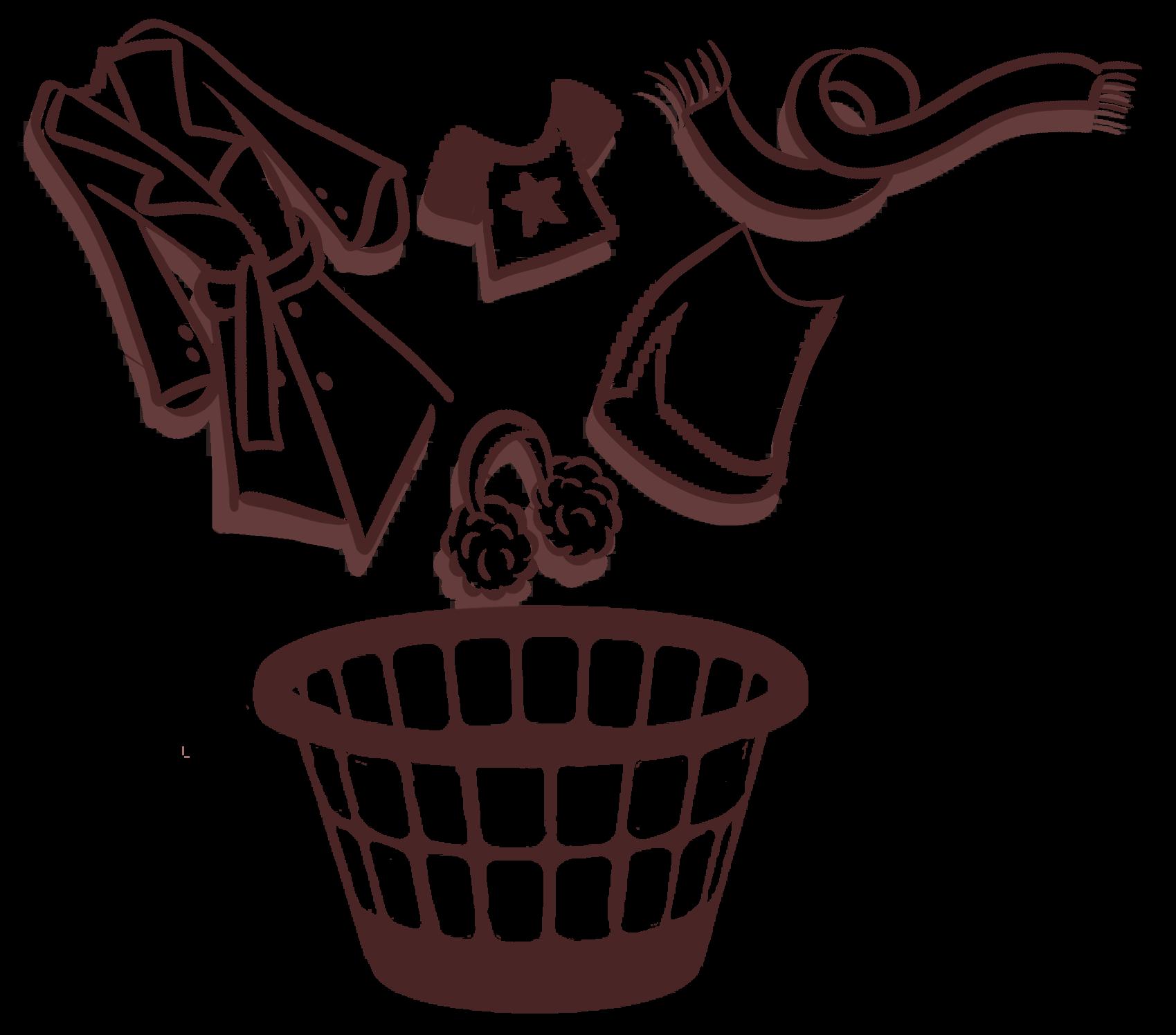
As much as I would like to deny this, as a freshman caving to our human nature to blend in, I have contributed to these figures today.
My first freshman experience began five years ago, when my parents and I traveled from my hometown in New Jersey to a town just a few miles north of Boston to
hues — and perhaps some faint plaid. My fashion expression was boiled down to black slacks when it was cold and choosing between skirts and shorts when the weather permitted.
My boarding school was what many would consider a progressive
While my school was one of the few without a dress code, students dressed rather preppy in 2020. Brands like LoveShackFancy and Roller Rabbit seemed like religion for the girls, and the boys often donned Vineyard Vines, Barbour or school merchandise advertising whatever sport they
I remember pulling a pair of tight, black capri pants that barely came past my knees out of my drawer. I modeled them for my friends, and I was met with furrowed brows and confused faces where I expected
I masked my embarrassment with agreement, instantly uttering that my clothes were weird. I’m sure I lied and said they were a gift my mom secretly shoved in my suitcase despite my disapproval —
My friend group once participated in a viral TikTok trend where you anonymously vote. To my shock — and quite frankly, to my horror — the only category I won was “Worst Dressed.”
I swiftly threw those capris away, wasting a perfectly good pair of pants. You see, I now realize I was ahead as a freshman. But at the time, I saw myself standing apart from the group, making myself
vulnerable and exposed.
If you check the tabloids today, you’ll find that black capris have been a major topic of interest in the 2025 spring and summer seasons. They have been featured on some of the most stylish celebrities, from Alexa Chung to the Hadid sisters.
A May 6 Vogue article details the resurgence of the capri, a staple of the Y2K wardrobe. Writer Talia Abbas comments, “While nostalgic references of Audrey Hepburn in ‘Sabrina’ and ‘Roman Holiday’ in capri leggings offer no shortage of inspiration, today’s controversiallycut pants feel delightfully fresh when styled into a modern wardrobe.”
Of course, I wish I had doubled down on those capris five years ago. How cool would it have been to say I didn’t care and enjoyed the look? I now know to stand by my decision harder and firmer — because it’s okay to carve your own path.
For incoming Boston University freshmen, this may be your first time moving away from home, but not your first time donning the term “freshman.”
If I can leave you with a few words of comfort, I’ll reassure you that in a sea of thousands of lost undergraduate students traveling up and down Commonwealth Avenue, you have been exempt from high school-era judgment.
In a buzzing city like Boston, it can be a blessing to fly under the radar — so wear those capris or that outfit you formerly hid in your drawer. You could be test-driving the next fashion trend without even knowing it.

As students, we’re often told the future is in our hands. As student journalists, we’re constantly reminded about the necessity of our emerging voices in holding truth to power.
But you might also have been told the integrity of our truth is dependent on its impartiality — that effective journalism operates on political agnosticism, and good writers keep their cards close to their chest. We are meant to serve as a barometer for the facts, leaving others to decide how to deal with the truth we uncover.
However, there’s more to news publications — especially student newspapers — than breaking headlines. Journalism depends on a symbiosis between context and meaning. Hard news reporting provides the essential facts, but opinion writing strengthens their significance.
Opinion columns, op-eds and editorials are essential to a publication’s trustworthiness. By intentionally distinguishing opinion and fact, the criteria for both become more defined, and
the visible siloing of the two gives credibility to a newspaper’s integrity.
In establishing this distinction, publications also give credence to the experiences of their writers and their reader base.
Journalists aren’t just robots tasked with absolute neutrality — we are also affected by the truths we disseminate and therefore swayed by personal perspective.
The opinion section provides a platform not only for the spectrum of beliefs held by journalists, but the spectrum of experiences that influence our commitment to storytelling.
If we reduce journalism to just the dissemination of fact, we also dismiss an essential component of the importance of a free press. News publications are not dictators of reality — they are forums for dialogue.
Accessible news is essential to both increase awareness amongst a reader base and give that base a platform for their own voices. An opinion section — through op-eds in particular — bridges the gap,
giving readers the opportunity to not only receive but also respond in their own voice. Rather than hierarchy, they create synergy between newspapers and the subjects of their coverage.
The opportunity for vocal dissent has always been important, but nowadays, it is absolutely essential. Student speech isn’t just being curtailed — it’s being actively persecuted, and opinion writing is some of the first to be targeted.
Tufts doctoral student Rumeysa Ozturk was arrested March 25 by plainclothes officers from the Department of Homeland Security and detained for six weeks by Immigration and Customs Enforcement in Louisiana.
Her unconstitutional detention followed her co-authoring an op-ed in the Tufts Daily, published a year prior, that called for the university to divest from Israeli companies and war profiteers and to actively recognize the “Palestinian genocide.”
While Ozturk was released May 9 after a judge determined her First
Amendment and due process rights were violated, her detention speaks to what Duke University student journalist Alice Qin called “the dramatic asymmetry in the risks and rewards of expression.”
In an opinion article for The Chronicle, Duke’s independent student publication, Qin illuminated the almost infinite accessibility the internet grants us is now overwhelmed by the increasing risks of persecution by a surveillance state that has demonstrated its uncompromising power.
As dissent becomes increasingly important, the systems for disseminating this dissent have become increasingly precarious, and the consequences for dissenting have become even more tangible. And as universities face threats from a presidential administration progressively hostile toward them, they must recognize student publications as means for student freedom in desperate need of protection.
The opinion section deserves recognition not only as a key
component of journalistic credibility, but as an essential mechanism for dissent.
Opinion writing narrows the divide between the newspaper and its reader base. It supplements the context that hard news reporting provides with meaningful perspectives and invites a vulnerability that other parts of the discipline do not have the capacity for.
But when we face the facts, none of these things matter if universities — including administrations, faculty, other students and the like — fail to recognize and protect student speech through opinion writing. As a means of giving a voice to the university, institutions have an imperative need to protect student speech and to not cave to the threats of a punitive state.
Even when critical of institutional bodies, universities must protect student opinion writing — not in spite of their image but because of it.
This Editorial was written by Opinion Co-Editor Ada Sussman.

YEAR LVI. VOLUME A. ISSUE I.
Published Friday, June 6, 2025.
The Daily Free Press is published Sunday through Thursday during the academic year, except during vacation and exam periods, by Back Bay Publishing Co., Inc., a nonprofit corporation operated by Boston University students. Copyright © 2025 Back Bay Publishing Co., Inc. All rights reserved.
Lauren Albano, Editor-in-Chief
Samantha Genzer, Managing Co-Editor
Crystal Yormick, Managing Co-Editor
Sam Mandala, Campus Co-Editor
Elizabeth Mehler, Campus Co-Editor
Liam Dunne, City Co-Editor
Leia Green, City Co-Editor
Karyna Cheung, Investigative Editor
Kailyn Smith, Sports Editor
Sophie Shatzky, Arts & Community Editor
Jack Schwed, Business & Science Editor
Anjola Odukoya, Opinion Co-Editor
Ada Sussman, Opinion Co-Editor
Erica Schwartz, Lifestyle Editor
Josie Kalbfleisch, Photo Co-Editor
Isabella Oland, Photo Co-Editor
Emma Jee, Master of Games
Mia Kitaeff, Multimedia Editor
Andrew Lay, Podcast Editor
Jenny Chen, Layout Co-Editor
Emma Clement, Graphics Editor & Layout Co-Editor
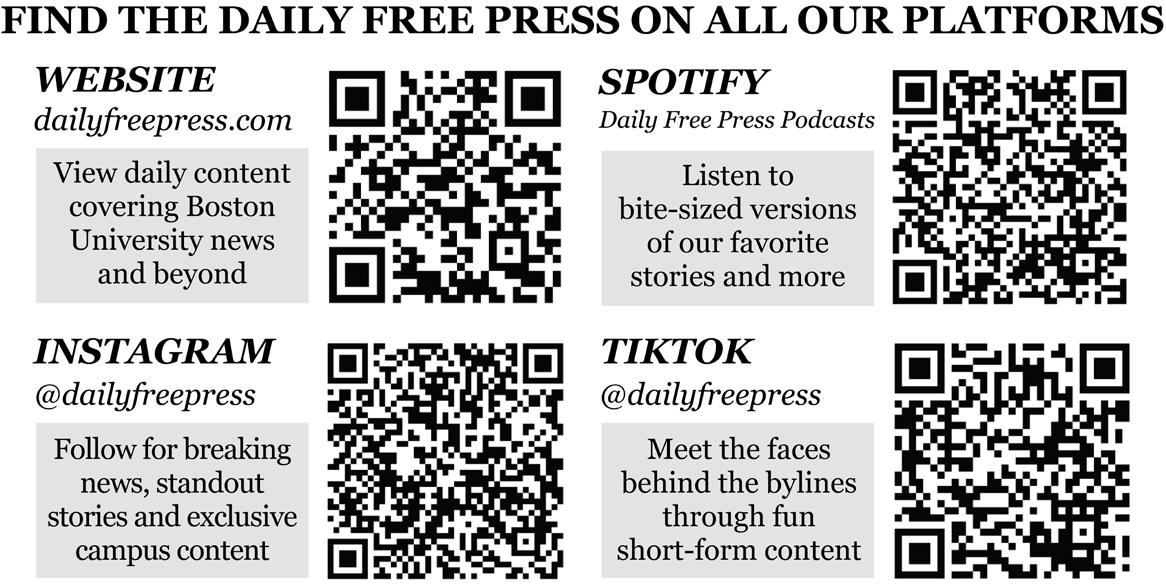

1. Games like PUBG and Fortnite, for short 4. BU’s “Jenga” building, for short 7. Student org. overcoming gender barriers in tech
10. Drink like a dog
11. Water’s nemesis
12. “ABC World News Tonight” anchor David
13. BU high school
15. Assistant 16. What a CS major might have done for homework
17. Plods through water
18. Understood 19. Harass mercilessly 21. Fourth floor library in CAS
23. Snake’s sound 24. Might be hidden under mattresses?
27. TD Garden, Fenway, for example
29. With 27-Across, BU men’s hockey game locale
31. Graduate degrees from Questrom
35. Lion sounds
36. “Beautiful Things” singer Benson
37. Plunge into a pool
38. UPS summer program during moving out
40. Those, in Spain
41. A term adrift for BU students
42. BU color
43. UFO personnel
44. Respond, abbr.
45. Like a one-word reply, perhaps
DOWN
1. Absence of color
2. Trash panda missing its doubles?
3. Gardening tool
4. Like some BU dorm floors
5. Not too bright 6. Like a fox 7. What a BU ambassador might do 8. Expands
9. Peaks of waves
12. Sir’s partner
14. Morning droplets
17. Small brown bird
19. Nickelodeon’s “Victorious” main character
20. Singles
22. Gets some sun
24. BU’s School of Global Studies
25. Self-centered person
26. Tequila sources
28. One’s cariño
30. God of war
32. With 1-Down, online classroom platform
33. Fiery character in “Inside Out”
34. Disreputable
36. Feathered accessories one might find at a Harry Styles concert
38. Cultural org. for students from a city-state in Southeast Asia
39. BU’s student to faculty ratio


BY GABRIELLA DI DEA Senior Columnist
It feels like the school year just ended, but here we are, looking ahead to the fateful 2025-2026 school year. If you’re reading this, chances are you’re about to enter your freshman year at Boston University.
I’m here to share some things I wish someone had told me when I started college.
The city of Boston really is your campus
When I toured BU, my guide said that Boston itself is our campus, and to that I say: yes and no.
While the campus does stretch pretty far, BU can feel like a bubble. So, my first piece of advice is to take advantage of the city that you’re in.
Get out of class early? Head to a café or go to Boston Public Library to feel like a true academic while you work.
Want to do something fun on a Saturday while the weather is nice? While BU Beach is great, try heading to Amory Park or the Boston Common instead.
I might be biased, but Boston is one of the most fun cities to attend college in — there are endless things to do, and it’s just
up to you to try them.
Your huge 15-person friend group probably won’t last, and that’s okay
During your first weeks, you’re going to meet a ton of people — all determined to make friends. Whether you’re an introvert or an extrovert, this process can be nerve-wracking.
What often happens is that everyone brings together all the people they’ve sort of clicked with, and that creates one massive friend group.
Now, don’t get me wrong — that era can be a lot of fun.
BU has so many different kinds of people, giving you the opportunity to interact with a variety of personalities.
But I don’t think we’re meant to be best friends with 15 different people, and that is completely okay.
Over time, with different schedules and friendship tendencies, you’ll get closer to some people, drift from others or leave the group altogether.
Don’t feel discouraged if you find yourself stuck in a friend group but still feel like you haven’t found your people yet — or if you felt super connected at first but things don’t feel right after a while.
People change, and that’s a good thing. You’re meant to grow and evolve, and you deserve to be surrounded by those who want to grow alongside you.
Choose classes that you’re genuinely interested in
It would be irresponsible of me to give advice on freshman year and not talk about the academic part.
As a BU student, you have access to a wide range of classes. If you want to knock out some HUB credits, try browsing for some that genuinely interest you.
While picking a class based on ease and Rate My Professor reviews is a strategy I’ve used, those classes never ended up feeling as easy as I hoped. That was because I didn’t genuinely enjoy them.
Last semester, I took an Italian film class that traced Italy’s history from the 1940s to
today. It was one of the most interesting classes I have taken, and that’s definitely an understatement.
Consider how much effort your classes will take, but remember you should enjoy them too. BU has amazing professors who are experts in their field, so take advantage of that and your interests.
Try out as many clubs as you’d like, but don’t overcommit yourself
A prerequisite no one talks about at BU is overachieving.
Every time you hear about someone’s high school experience, it sounds like they did everything under the sun, making you wonder how they had time to eat, sleep or breathe.
While that could’ve been fun for some, I know it felt exhausting for many others — including myself.
So here’s my advice: you’re not in high school anymore, so don’t act like you are. You don’t have to join a million extracurriculars.
Stick to the ones that you’ll genuinely find value in — whether they align with your major or just an interest you want to explore.
Focusing on a few things you truly care about helps you excel. If you overburden yourself, you probably let some — if not all — things slip, and not give your best. Be kind to yourself, and only commit to what you truly want to do.
El Jefe’s, T Anthony’s and even CityCo can be your late-night best friends
If you’re hungry past 10 p.m. and on a dining plan, your options
immediately become limited to the Late Night at a few dining halls, which can feel disappointing.
But have no fear — you have other options. Well, only a handful, but it’s something.
My personal favorite is El Jefe’s Taqueria, located in West Campus and in Kenmore. It’s delicious, the guacamole is free and it’s open until 2 a.m. in Kenmore and 3 a.m. in West Campus. If you’re craving dessert, the Nutella empanadas are chef’s kiss.
I like to think of El Jefe’s as a much more authentic-tasting Chipotle, but that’s just me.
Another popular spot is T Anthony’s Pizzeria. It has every late-night food imaginable — burgers, mozzarella sticks and wraps — and it’s open until 2 a.m.
Finally, a great last resort option is City Convenience — also called CityCo.
It might seem boring, but CityCo has a lot to offer. Plus, you can use dining points there, so you don’t have to drain your bank account for late-night snacking.
My final note to freshmen
Everyone says these will be the fastest four years of your life, and I wish I could tell you that’s an exaggeration. I’m about to start junior year, and it still feels like I just got here.
Above all else, I wish someone had told me that college isn’t something you’re supposed to master on day one — it’s something you grow into.
You have four years to explore, learn, mess up and start again. Don’t rush the process — just be present for it.
Welcome to BU. You’re going to do great.
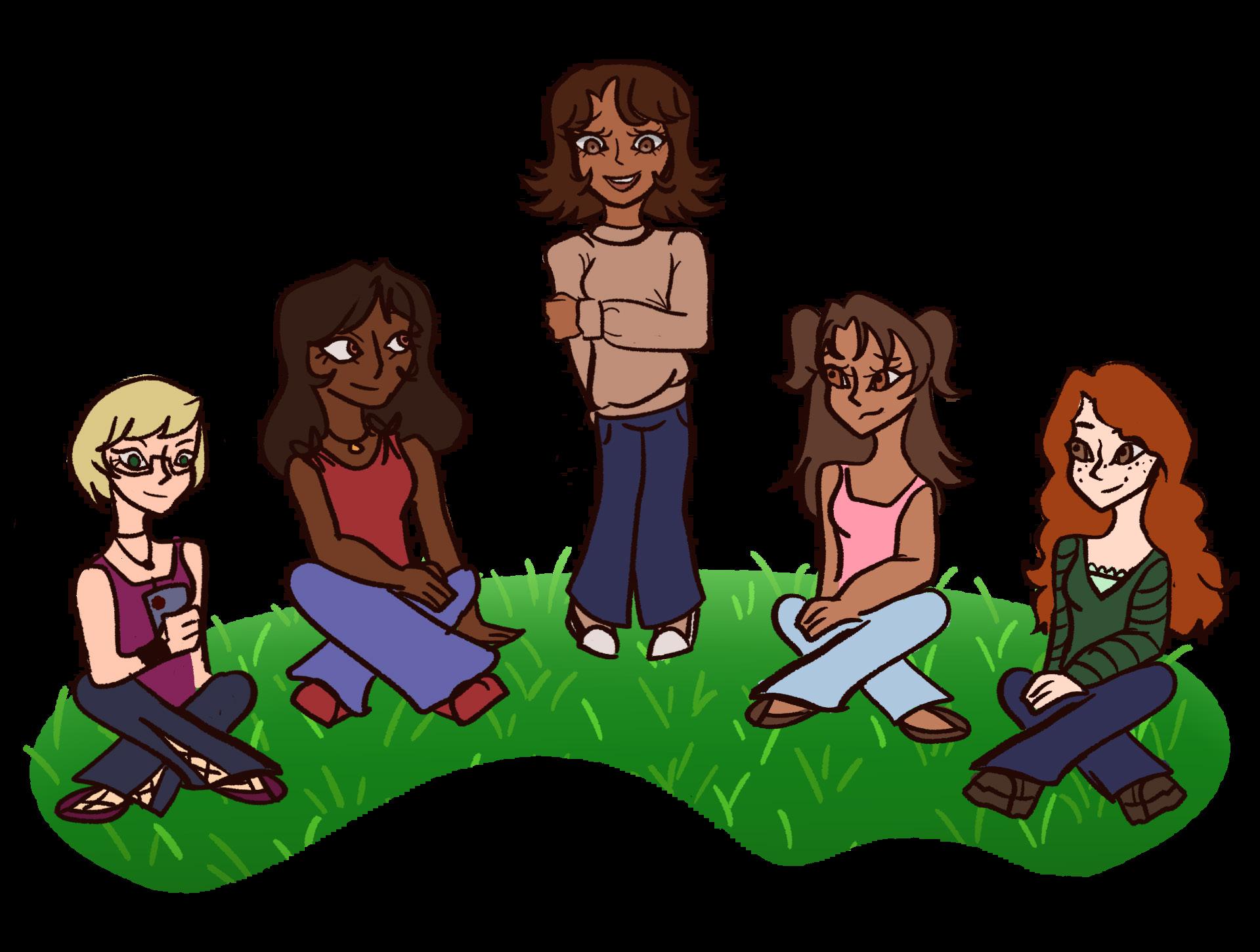
BY EMMA CLEMENT Graphics Editor & Layout Co-Editor
With such a short move-in period before classes start — and the looming knowledge that everything you move in will have to be moved back out less than nine months later — it can be easy to neglect to decorate your dorm room. Despite the hassle it can be, fully personalizing your room is worth the trouble.
For most freshmen, college is the first time they’ve lived away from home long-term. Making your dorm feel like a home can do wonders in helping you adjust to being away.
I had every reason to opt for the easier route of keeping my dorm simple.
My hometown is far enough from Boston that I can only reasonably travel to and from BU by plane. This means I purchased a lot of my dorm essentials once I got to Boston and had to find a summer storage plan for many of my belongings. On top of that, I lived in a triple.
Regardless, I ultimately chose to prioritize making my room feel like my own, and it was so worthwhile.
The first rule I swore by was to have as little open wall space as possible. Try to cover your walls with something to avoid the stale, uninhabited vibe dorms often have when you first enter.
My room has always been my safe space. It is a sanctuary where I can be myself and where my interests, hobbies and goals take priority.
If you feel similarly, know you don’t have to sacrifice that just because you’re sharing the space with other people.
As long as you and your roommate — or roommates — are clear about allocating wall space, you should feel empowered to cover your walls however you want.
reel of my life — memories, interests, hobbies — and that really helped make my part of the dorm feel like mine.
In addition to an abundance of wall decorations, keeping your room comfortable is essential to making it feel homey.
I highly recommend secondary light sources like fairy lights or a desk lamp — both of which completely transformed the atmosphere of my room when I turned them on.
My bed was also a huge part of what made my room cozy. Several pillows, a comforter, a throw blanket and a healthy amount of Squishmallows made it the perfect spot for relaxation.
My roommates and I arranged our room so it had a more closed-off floor plan, allowing each of us to have our own little corner. This created unspoken boundaries between shared and personal items, which was ultimately very helpful for us.
Back at home, my bedroom walls are covered in TV show and music posters, so I did the same for my dorm. This made my dorm feel just as comfortable as the room I grew up in.
My walls were also filled with photos of family and friends, which helped with any homesickness I felt. When I went to bed each night, I could look at my walls and see a highlight

While these items can certainly be difficult to transport at the end of the school year, with the help of vacuum-sealed bags, they are a worthwhile addition that I would not advise passing up.
In addition to decorations, the furniture arrangement in your room can really make a difference in how your portion of the dorm feels.
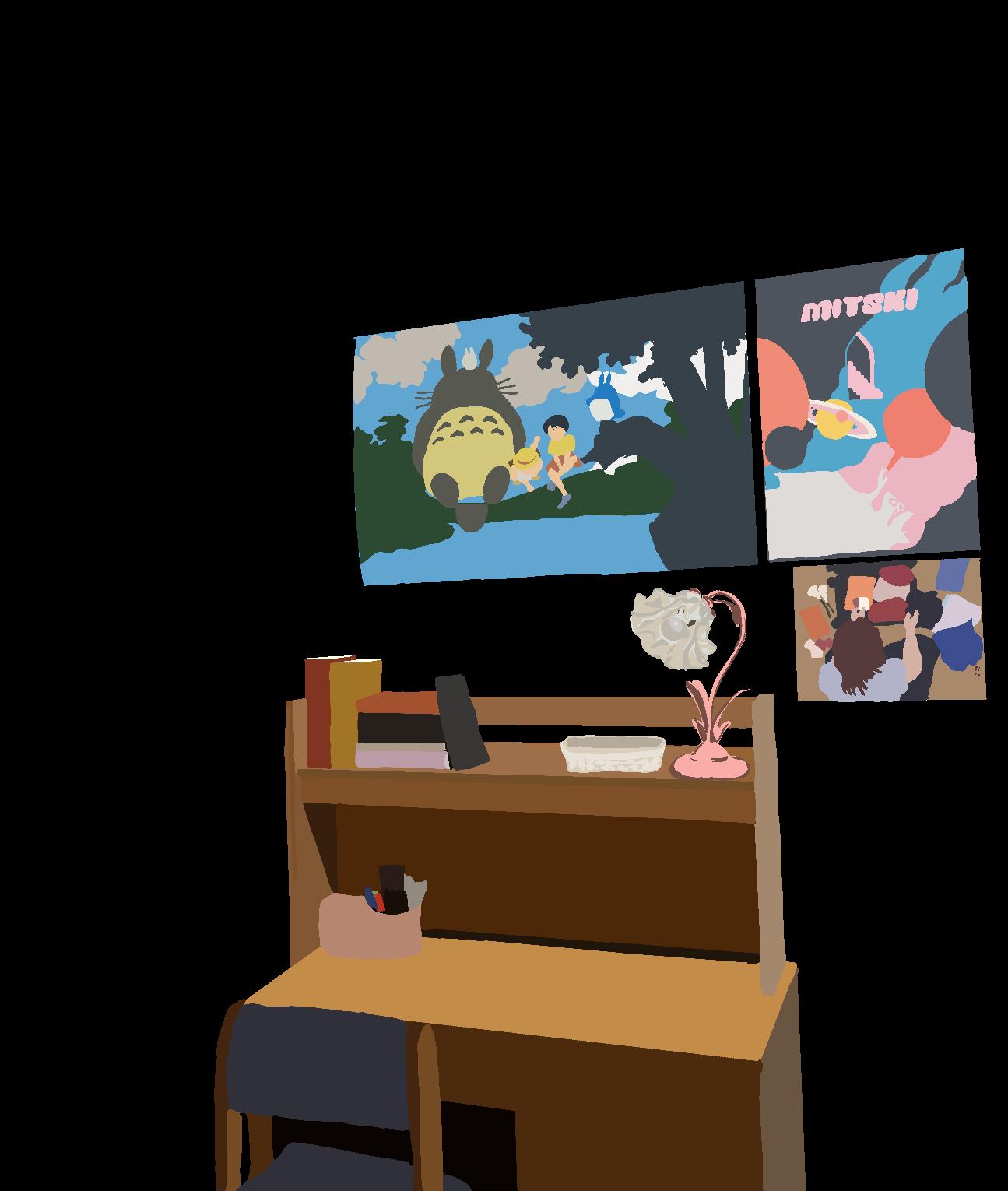
When I walked into my dorm for the first time and saw that the two remaining open beds were parallel to each other and less than five feet apart, I knew instantly that wouldn’t work for me. I needed to have a space that was mine and had all my items within it — both furniture and decorations alike.
If possible, I recommend arranging the given furniture — typically a bed, desk and dresser — to build a mini area for yourself within the larger room.
Instead of feeling like I was fully sharing a room with two other people whom I had met just days ago, I felt like I had my own smaller room within a larger space that we shared. Though I would call my freshman year dorm experience a success, it was not without its struggles.
Moving into your college dorm as a freshman can be a daunting process, but you shouldn’t be afraid to make your space yours.
I had to have some awkward conversations with roommates. I made some compromises regarding my ideal dorm appearance. And, of
course, I had to find a way to store all my belongings at the end of the year.
That being said, I don’t regret the extra time and effort I put into styling my dorm the way I like it. Your dorm is your home for the year, and you should be able to make it feel like a home — even if that means having difficult conversations about floor space, an obnoxious amount of posters or even a few too many Squishmallows.
BY KARYNA CHEUNG Investigative Editor
After one pivotal interview, Daily Free Press editors Brendan Galvin and Mara Mellits knew they had a story.
Their reporting process began in the spring of 2024 when Mellits, who served as editor-in-chief during the fall 2024 semester, saw Reddit posts alleging student athlete abuse from Gabe Sanders, Boston University’s former director of track and field and cross country.
Over the course of about a month, Mellits and Galvin, the spring 2025 editor-in-chief, contacted former and current student athletes to discuss their experiences with Sanders. Initially, none of the athletes on the team responded.
A week and a half into their investigation, a current athlete reached out to Galvin. Though they were hesitant, they agreed to an interview on the condition of anonymity.
Galvin and Mellits both said the interview was one of many emotional conversations they had with sources during their reporting process.
“That [interview] will probably end up being the most influential, impactful interview I will ever have as a college journalist,” Galvin said.
The article, published in April 2024, won a runner-up award for student investigative reporting in intercollegiate athletics from The Drake Group Education Fund, an advocacy organization focused on expanding educational programs. Mellits said she received messages from parents of former athletes
thanking her for her reporting, and Galvin said he received emails from a few alumni.
“You don’t know after a story is published how people are going to perceive it,” Mellits said. “Just seeing that support and getting those messages definitely makes it feel more real.”
Many investigative stories originate from a tip, word-ofmouth, a complaint or observations of the community. They are the product of conversations and building relationships, and they provide platforms for discourse on important and underreported topics.
For the past three semesters, The Daily Free Press investigative team has produced stories that directly impact the BU community, from University finances to faculty, staff and institutional misconduct.
Writers Cameron Morsberger and Colbi Edmonds broke the paper’s first investigation in October 2021, several semesters before the official team was established. Their story covered Shiney James, a former BU orientation director, who was accused of abusing student employees and creating a “toxic” work environment for more than a decade.
The University independently investigated James after the article was published — she resigned the following spring.
“It’s incredible how those stories can come to light in that way and that people trust us enough to come to the student paper,” said Fall 2023 Managing Co-Editor Emilia Wisniewski.
Wisniewski and fellow Managing Co-Editor Stella Tannenbaum spearheaded the effort to create an investigative team,
which became official in the spring 2024 semester under the guidance of Mellits as the DFP’s inaugural investigative editor.
The two edited a series examining the alleged mismanaged funds of BU’s former Center for Antiracist Research in the fall of 2023, which included a Q&A with the Center’s director, Ibram X. Kendi.
This investigation, which was conducted before the investigative section was officially established, drew hundreds of reactions from DFP readers. Six weeks later, the University completed an internal audit of the Center’s finances that found no misappropriated financial expenses.
The section’s following stories revealed the University’s resistance to negotiate with part-time faculty, teachers at the BU Children’s Center and resident assistants.
“Those stories would go untold without an investigative section,” Galvin said. There’s no other group on campus who’s gonna take the responsibility to write about that.”
During the spring and fall of 2024, the team obtained documentation concerning former College of Communication writing professor Tinker Ready. The reports alleged that she made discriminatory remarks against international students and verbally attacked a student. Ready, who was on paid administrative leave when the story was published, no longer works at BU.
Over the following two semesters, the investigative section continued coverage of issues close to students, including a report covering on-campus accessibility and disruptions for Warren Towers residents because of ongoing

A collection of investigative articles on the front pages of The Daily Free Press print editions. Stories like these, researched, written and published by the DFP, have impacted the Boston University community and shed light on important issues for students, faculty and administration.
renovations. Other stories extended beyond BU’s campus to examine the city of Boston’s bike infrastructure or uncovered donations made by the Musk Foundation to a BU rocketry group.
Investigative stories often require dozens of interviews, months of research and hours of data collection.
The most recent investigative stories, published by a team of seven DFP writers May 2, informed the BU community of the University’s “unsustainable” budget practices and Office of Diversity and Inclusion program cuts. The team established relationships with sources, analyzed the University’s financial statements and obtained documents inaccessible to the general public to report both issues.
As the only news outlet on BU’s campus without affiliations to the University, the DFP investigative section holds a unique position — it
is able to report on topics other oncampus news outlets cannot cover. The team works collaboratively to make a story happen.
“You’re not going to get any of these experiences [from] any other outlet on campus,” Galvin said. “It’s a once-in-a-lifetime opportunity to write for this section.”
Investigative journalism is a vital part of any newsroom, especially a student paper, Wisniewski said.
“It’s so important for student papers to have that reputation for being accurate, especially in the last decade when news has been under attack,” she said. “Truth is everything. Factual things are everything, and it’s really what drives The Daily Free Press.” Brendan Galvin, Mara Mellits and Emilia Wisniewski held positions on The Daily Free Press Editorial Board in recent semesters. They were not involved in the reporting, writing or editing of this article.

BY NICOLE ABRAMS Associate Campus Editor
Boston University Students for Justice in Palestine and the University’s chapter of Young Democratic Socialists of America faced disciplinary action from the Student Activities Office this spring semester.
These actions restricted the groups’ activism and forced them to either pause their efforts or find alternative ways to organize.
SPJ disaffiliated with BU shortly after SAO placed the group on probation in March. The probation stemmed from SJP posting flyers demanding BU to divest from Israel and hanging a banner outside of the College of Arts and Sciences. Both actions violated the University’s Publications and Publicity Policy.
Senior Mary Haddad, a former member of SJP, said the group has “continuously” faced disciplinary action from SAO in the past, including a formal warning following a series of “study-in” demonstrations in November 2024.
“It’s typical of them to try and silence us,” she said. “I was not
surprised.”
After an emergency rally organized by SJP on March 5 at Marsh Plaza — just two days after the group was placed on probation — the organization experienced increased policing that made it “incredibly difficult to function under the University,” Haddad said.
The University’s probationary measures restricted SJP’s ability to reserve tables at the George Sherman Union or other spaces to meet on campus without clearance from SAO. They also required SJP to send 10 members to an “SAOsponsored training.”
“It’s a way to avoid putting us on suspension, like they did [with] YDSA,” Haddad said.
Haddad said SJP leaders chose to disaffiliate with BU because the group was “constantly being surveilled.”
“Everything we did was being watched and responded to by SAO and everyone was really tired,” Haddad said. “They did a good job at pushing us out.”
BU Spokesperson Colin Riley said SJP “voluntarily disbanded” the organization.
The group was renamed the Quinobequin Student Front For
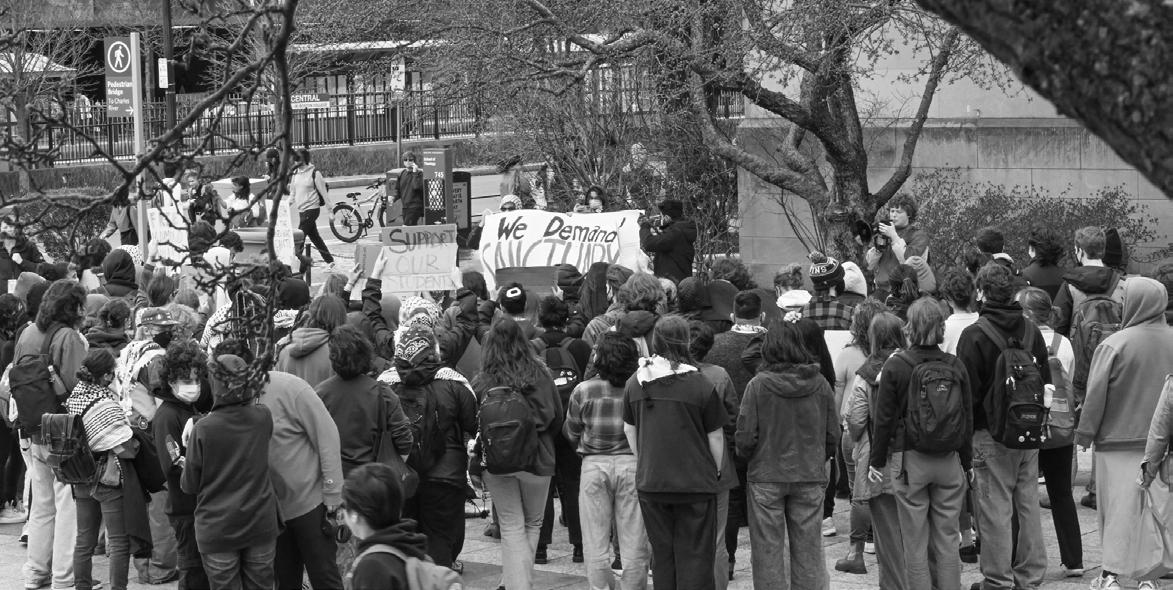

Palestine after disaffiliating from BU and continues to practice student activism, Haddad said.
While Haddad is not currently a member, she said QSFP “will continue to fight for divestment,” despite no longer being able to operate on campus.
“Pulling out as a club does not erase the people that were originally a part of it,” Haddad said. “The activism will continue whether it’s with SJP or not.”
YDSA was suspended in April by SAO for postering and organizing a sit-in at the Dean of Students’ office, urging BU to declare itself a sanctuary campus. Unlike the SJP probation, the YDSA suspension fully bars the group from operating on campus until December.
In an April 12 Instagram post, YDSA wrote the suspension was issued “because of [their] vocal opposition to the University.”
However, Riley said YDSA’s suspension was in response to “documented violations of University policies,” including posting unauthorized materials on campus. YDSA leadership was informed of these violations in a meeting with BU administration,
he said.
“We don’t punish students for viewpoints. It’s just a response to violations of time, place and manner policies, and that applies to all student groups,” Riley said.
All posters and flyers must be placed only on “authorized bulletin boards” or “free expression boards,” according to SAO guidelines on postering. These materials cannot be placed on “walls, doors, windows, or trees and may not be attached with permanent adhesives.”
Riley said these rules are meant to prevent littering on campus.
Haddad said that while posters are effective in spreading information, there are “limited locations” where posters are permitted.
“It’s really another way for BU to limit the information that reaches students,” she said.
Tony Wu, vice president of BU Student Government, said he is advocating for YDSA’s reinstatement on campus through conversations with the Dean of Students and SAO.
“As a university, we can do better in terms of how we can better support student activism and such
critical work on campus,” Wu said. Wu said that while YDSA and SJP violated SAO guidelines, he does not believe the probation or suspension was justified, as the “nature of their work involves civil disobedience.” The actions taken against the organizations by the University are a “violation of their rights,” he said.
“There must be a path forward that does not involve suspension because it’s really about the fundamental freedoms to speech and assembly,” Wu said. “We cannot understate just how impactful these suspensions may be to students on campus who may now feel even more unprotected or unheard given the recent political climate that we live in.”
Senior Stephanie Donahoe, president of BU’s Mixed Student Union, a discussion-based space for students with multiple cultures or ethnicities, said she finds the disciplinary action taken against these clubs to be “belittling.”
“We deserve, as students, to feel safe, to feel heard, to feel protected and to be able to ask more from our universities in our country,” she said.
‘In the end, it was a lot sweeter’:
BY ETHAN POTT Contributing Writer
The No. 2 Boston University Terriers softball team (39-19, 14-4 Patriot League) defeated the No. 1 Army West Point Black Knights (3522, 16-2 PL) on May 11 to clinch its third consecutive and eighth overall Patriot League tournament championship.
In each of the two previous seasons, BU was the first seed. In 2023, the Terriers had a 17-1 record in conference play, continuing their dominance of the PL by going 18-0 in conference matchups in 2024.
The Terriers’ in-conference winning streak was shattered late in the 2025 season. In April, BU dropped a series each against Army and the Lehigh Mountain Hawks (2824, 13-5 PL) — the opponents they would eventually face in this May’s PL tournament — losing the Terriers their rank.
The team felt they were competitive and close to victory despite crucial mistakes.
After an imperfect pitch from recent graduate Kasey Ricard, one of the team’s captains and ace pitcher, cost the Terriers the game, Army relished in their victory on BU’s Softball Field.
“We took note of that celebration,” said Head Coach Ashley Waters.
Waters and veteran players helped the young team get back on track
under pressure after the setback.
“It’s second nature for us to know how to do things at this point, but we take them under our wing and show them the way,” said Captain Sydney Pecoraro, a first baseman and recent graduate.
Waters always says “postseason is a brand new season,” said senior second baseman Brooke Deppiesse.
“You can play looser and play more free,” Deppiesse said. “Mentoring them in that way was easier for them to stay present, stay in the moment.”
In the opening round game against Lehigh on May 8, Ricard led the Terriers in a close pitching duel.
The Terriers’ lone run came off a homer from junior outfielder Sophie Naivar, her first of the season. The game was suspended in the bottom of the fifth inning, pushing the final six outs to May 10 — where BU held out a 1-0 victory.
Ricard said she pitched her “best softball” that game, having struck out eight and allowing no runs in a complete seven-inning game.
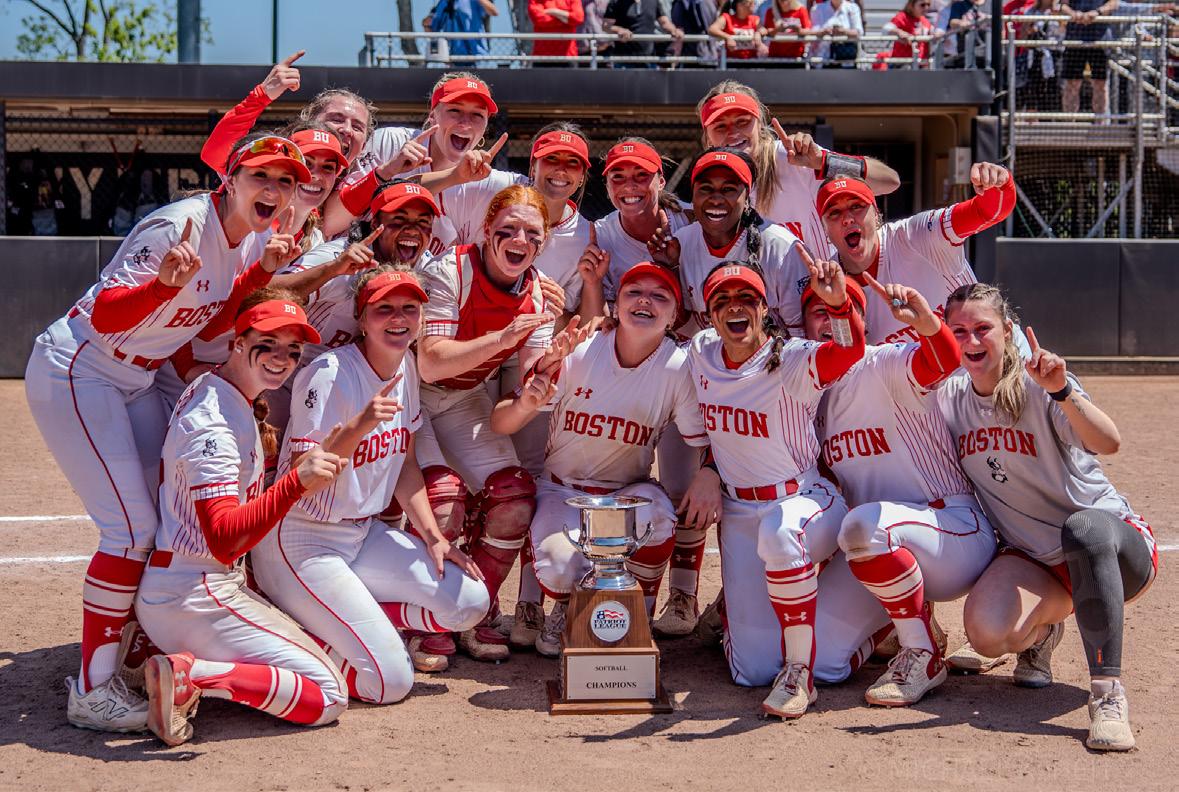
This was the Terriers’ third consecutive and eighth overall Patriot League tournament championship, a meaningful title after a tricky 2025 season.
She recalled being worried at the suspension.
“I’m like, ‘This can’t be how we lose this game,’” she said. “Thankfully, we played good defense that day.”
Though the offense outside of Naivar went quiet against Lehigh, the first game of the final against Army later that day was an 8-0 blowout.
Waters attributed this to a change in batting order: Deppiesse was moved to the leadoff spot and recorded four hits with three runs batted in.
Ricard called Deppiesse a “tone setter” in that game for always getting on base.
“[Army] didn’t know how to pitch to her,” Ricard said. “It would fluster the whole defense.”
The next day, BU put away Army with a 3-2 comeback win. After Army got two runs off Ricard in the first inning, Waters handed the ball to sophomore pitcher Danika Nell, who pitched six scoreless innings.
“I wanted her to get that win for how hard she worked all season,” Ricard said, as Nell missed all of March due to injury.
The Terriers got on base in six of seven innings, and Waters said it was a matter of “breaking through.”
That breakthrough came in the fifth inning, when Deppiesse and junior outfielder Kylie Doherty hit RBI singles.
BU not being favored to win the tournament made the victory even
more rewarding, Deppiesse said.
“Being placed as a two-seed fueled our fire,” she said.
It was a sweet comeuppance for a rival that gave the Terriers a reason to seek vengeance. Ricard said the team got revenge when celebrating their conference victory at Army’s home stadium.
“In the end, it was a lot sweeter to win on Army’s field versus winning on our field,” Ricard said.
The Terriers faced adversity in the 2025 season with lots of “trials and tribulations,” Waters said, which made the title even more meaningful.
“When you know what was happening behind the scenes, and then you’re standing in the middle of the field holding that trophy, you know that thing did not come easy, and it was actually earned,” said Waters. “No one handed it to you.”
The Terriers’ season ended in the 2025 NCAA Tournament’s Norman Regional in Oklahoma, when they lost to the Oklahoma Sooners and Omaha Mavericks. However, the 2025 Terriers will always have their PL title and threepeat.
Expectations remain high going into the 2026 season.
“If we can win a game in the state that we were in that whole season, then we can do it three times over,” Pecoraro said. “They can win again next year because we were literally in shambles this year, and we still found a way to win.”
BY KAILYN SMITH Sports Editor
For the first time since 2017, the Boston University men’s basketball team will face off against the Harvard University Crimson in the annual Naismith Basketball Hall of Fame Showcase on Nov. 22.
The Naismith Memorial Basketball Hall of Fame is located in Springfield, Massachusetts, where James Naismith invented the game of basketball in 1891.
The Hall — often referred to as “Hoop Hall” — organizes more than 70 high school and collegiate basketball competitions each year, including the Women’s Showcase.
This year’s showcase features two matchups between Penn State and Providence College, followed by BU and Harvard.
In an announcement May 14 from the Hall, President and Chief Executive Officer John Doleva said the event “continues to be one of the premier early-season
BY KATE KOTLYAR
DFP Photographer
Red Sox games are a special part of greater Boston culture that the Boston University community participates in as well. On game days, the city comes alive as fans, locals and students flock to Fenway Park,
and Lansdowne Street to see friends and eat food.
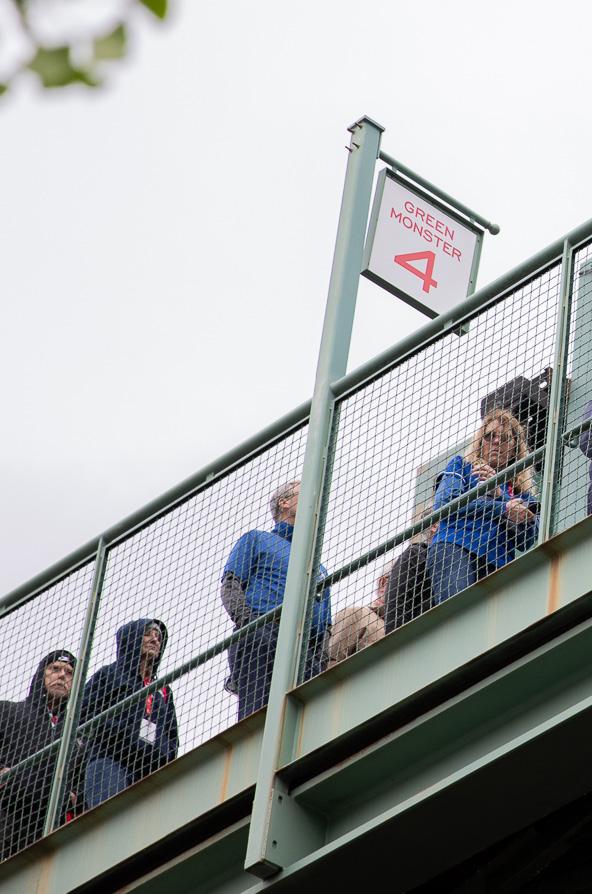
showcases in college basketball,” as they welcome “outstanding programs and their fan bases” to the arena.
The Terriers look to renew their rivalry with Harvard on one of basketball’s biggest stages — Mohegan Sun Arena in Uncasville, Connecticut, home of the Women’s National Basketball Association’s Connecticut Sun.
In the last 16 matchups between 2001 and 2017, BU and Harvard’s men’s basketball programs traded eight straight wins and losses each.
Joe Jones, who is entering his fifteenth season as head coach, shared his excitement in the Hall’s May 14 announcement about the team’s participation.
“[The Hall of Fame Showcase] is a great opportunity for our program to play against two quality opponents,” he said. “The matchup with crosstown rival Harvard will certainly bring out the Boston basketball fans to a first-class venue in the Mohegan Sun Arena.”
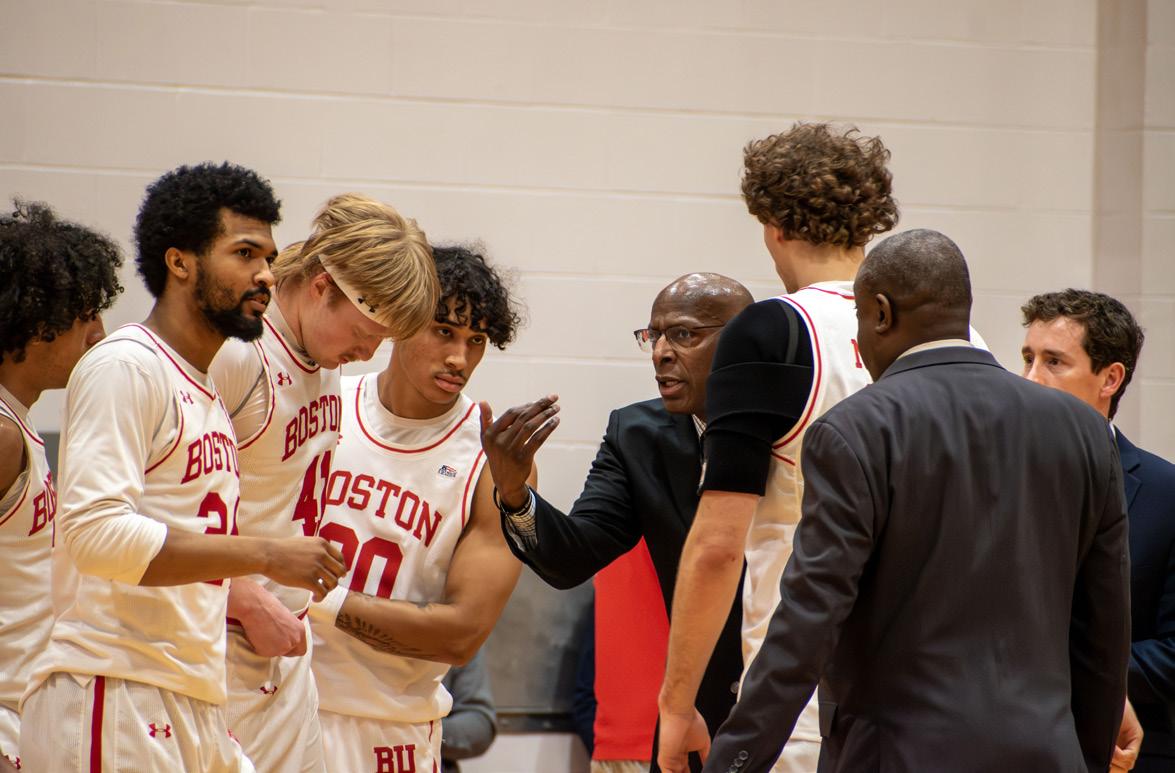
Jones is just 14 wins shy of achieving the most victories by a head coach in BU program history. The Terriers are on pace to
help Jones secure this milestone, winning 16 games last season and achieving a winning record in conference play.

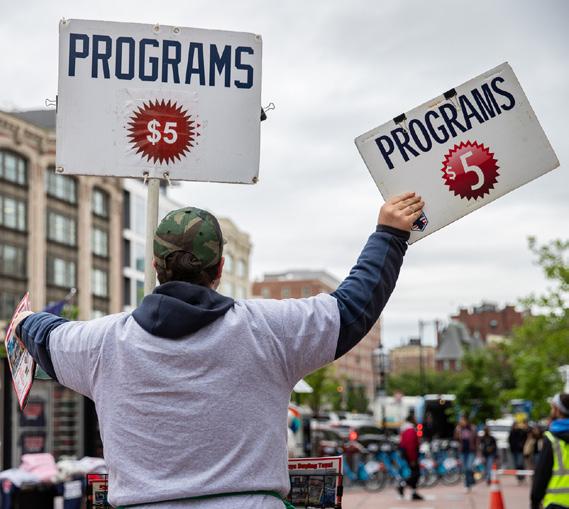

Last October, men’s basketball alum Javante McCoy was called up to the Detroit Pistons after a standout performance with the Motor City Cruise. He last played for BU in 2022 and finished second all-time in made field goals.
Members of the BU community have several opportunities to celebrate the men’s basketball program beyond the regular season.
Tickets to the Showcase go on sale Sept. 5 and 6 in the midst of Enshrinement Weekend, in which the Hall of Fame Class of 2025 will be inducted. This year’s class features history-makers including the 2008 U.S. Men’s “Redeem Team” and WNBA legends Maya Moore, Sue Bird and Sylvia Fowles.
BU fans of basketball at all levels can tune into two exciting moments in September by tuning into the Enshrinement Ceremony and making plans to cheer on the Terriers at the Showcase in Uncasville in November.
